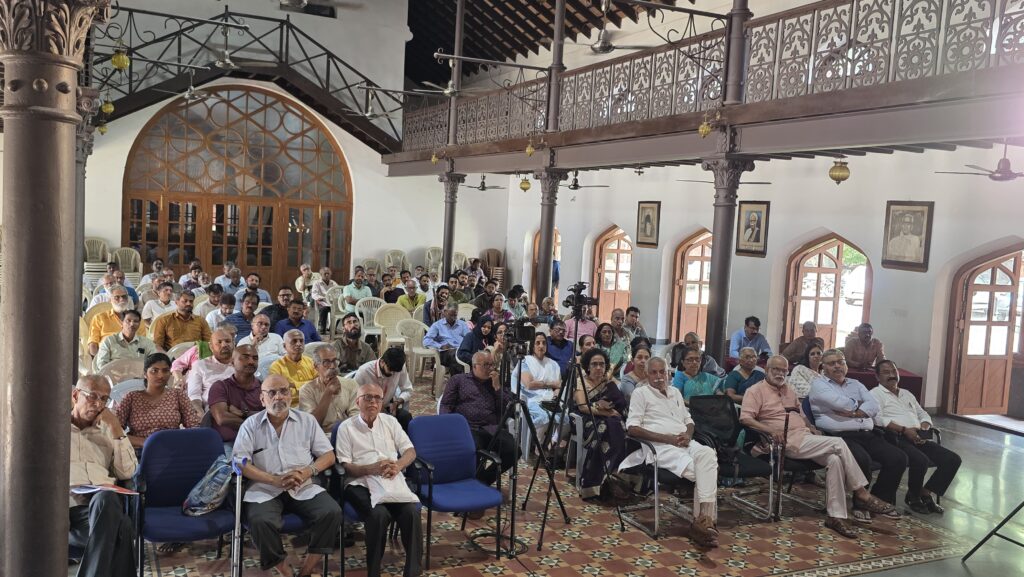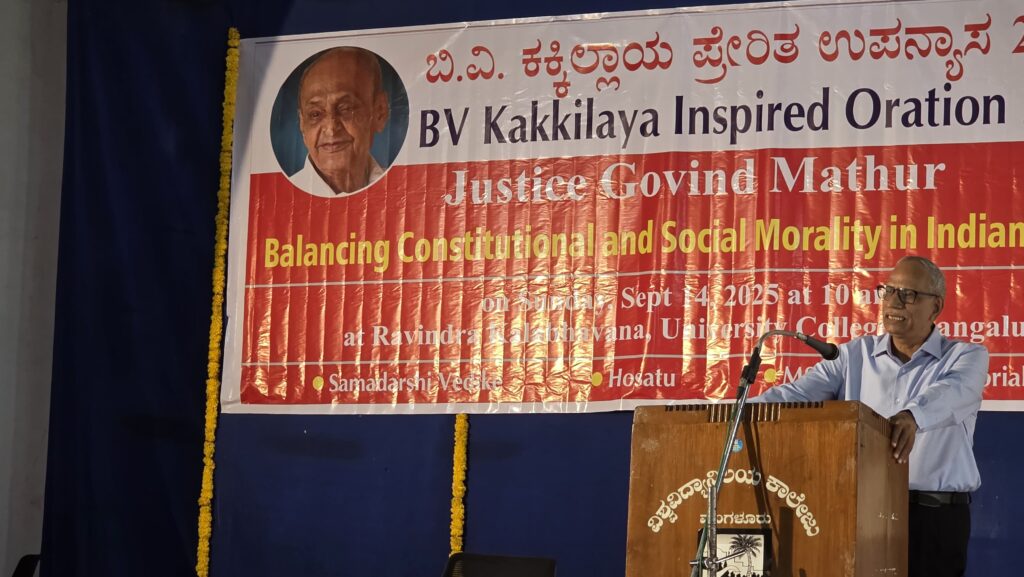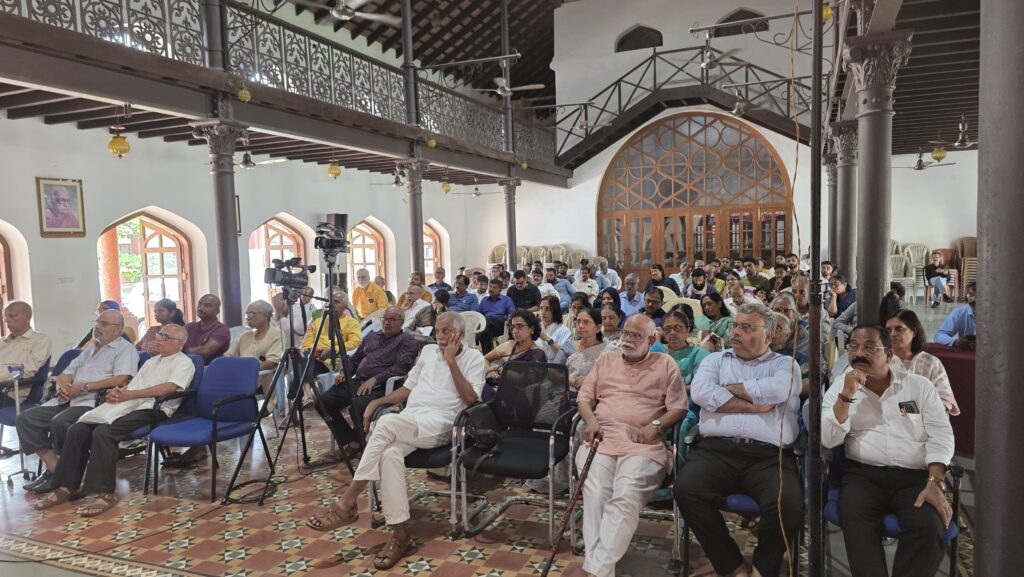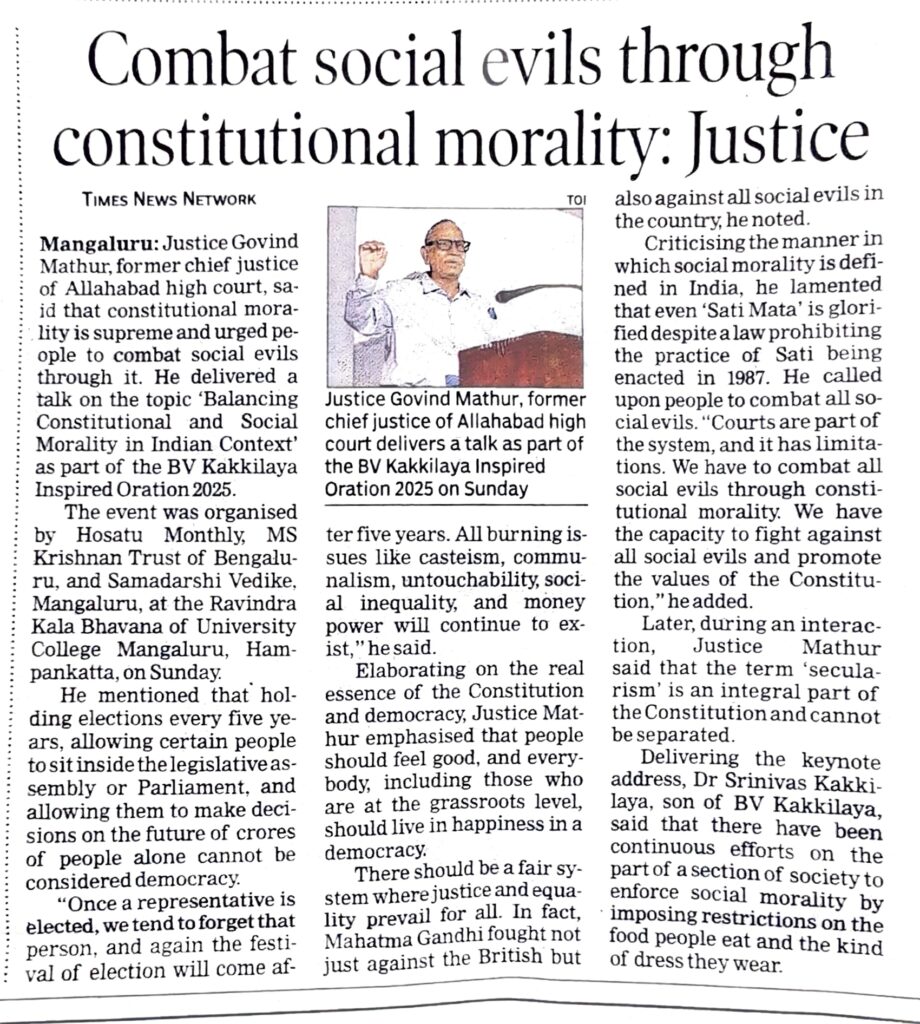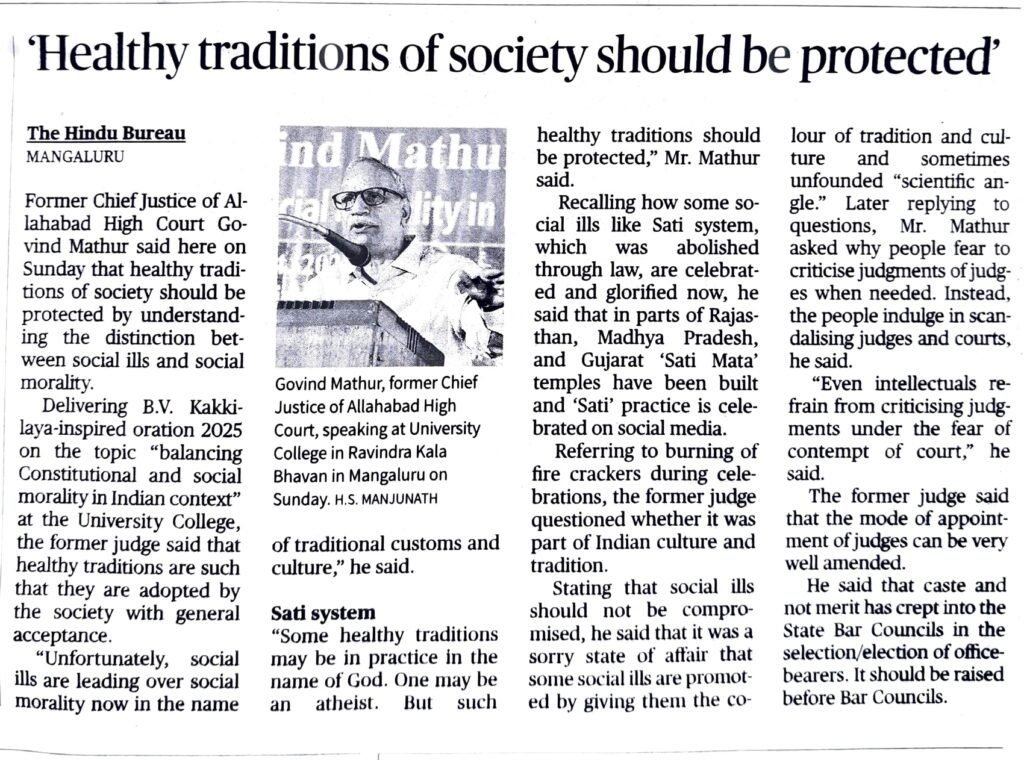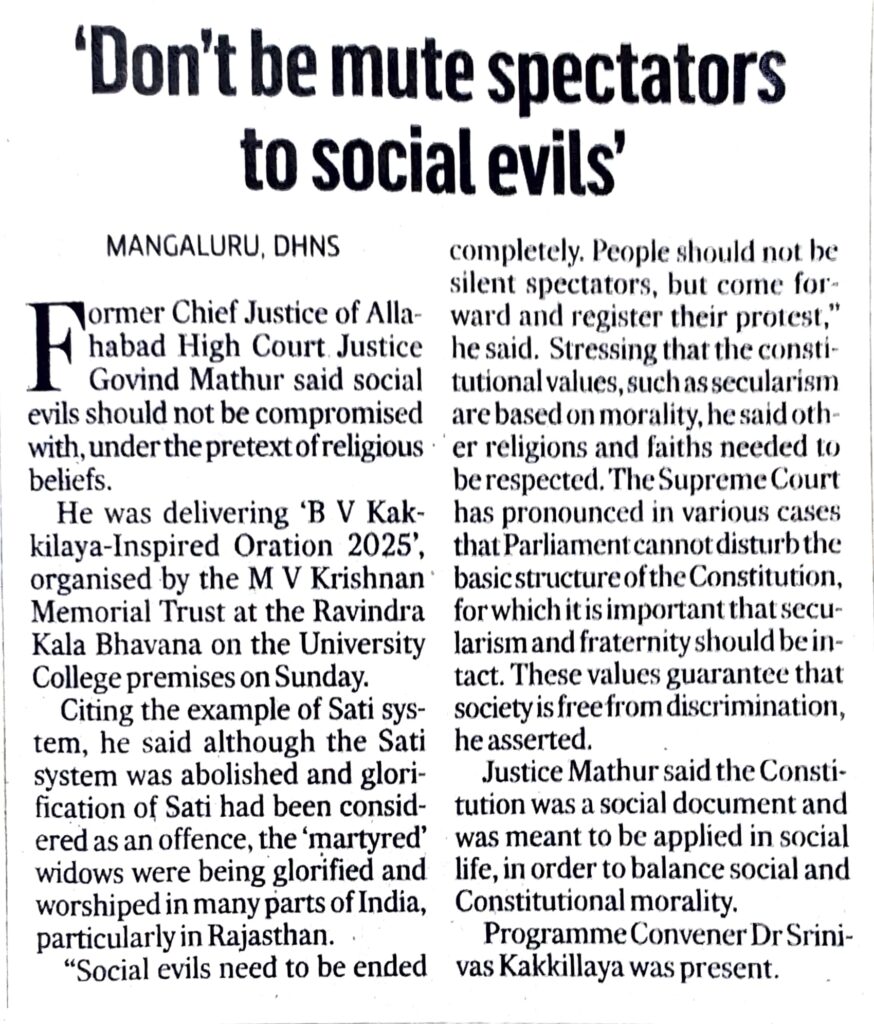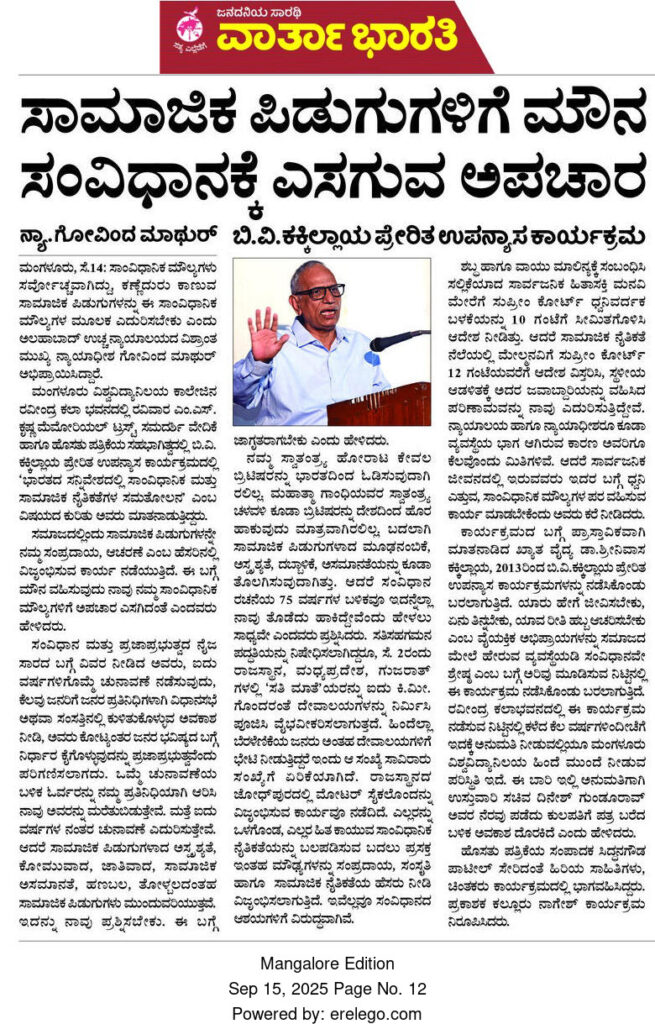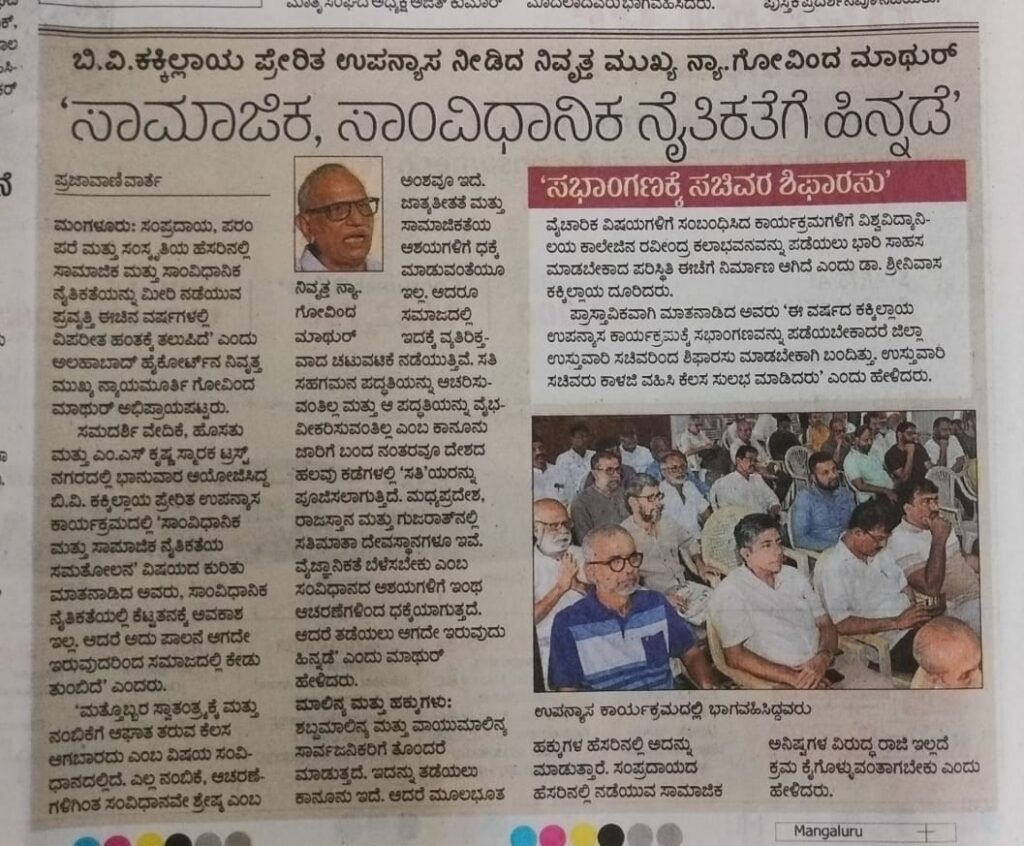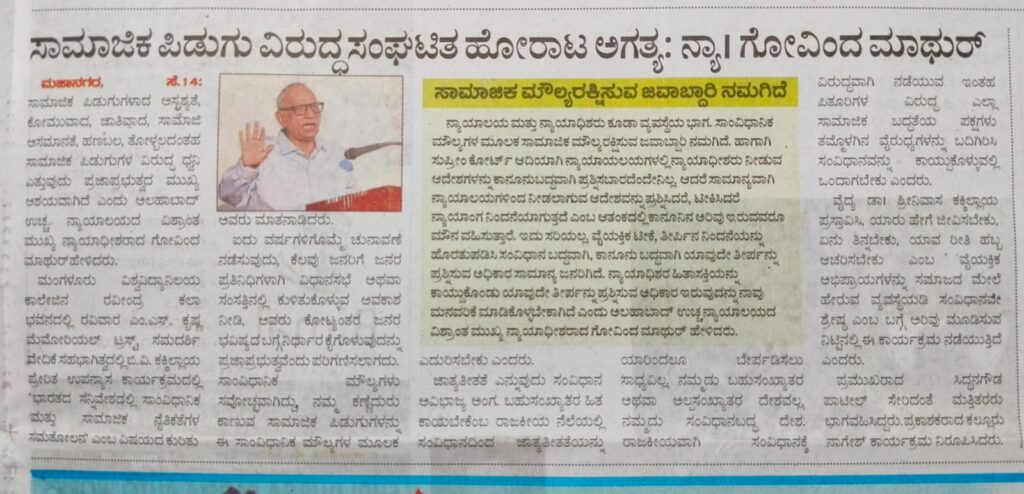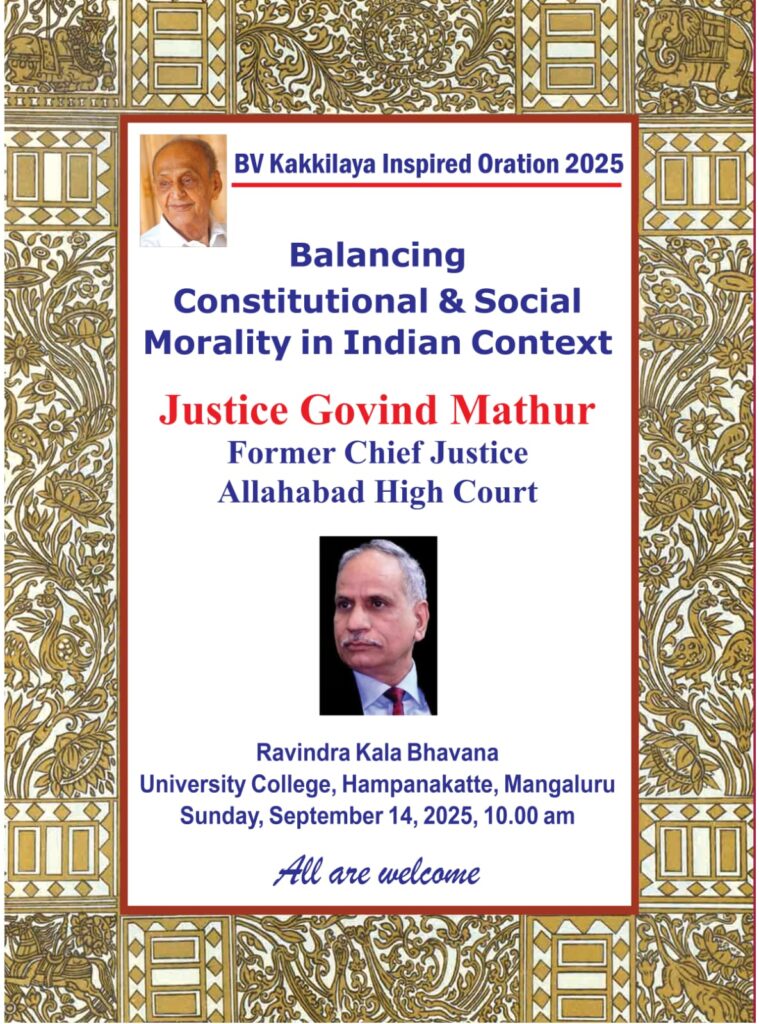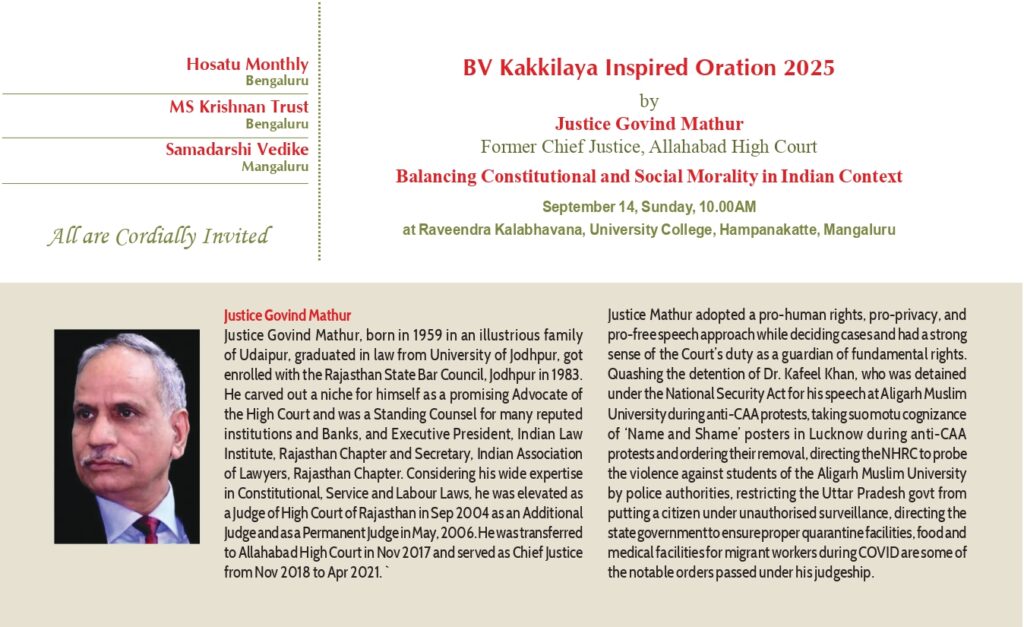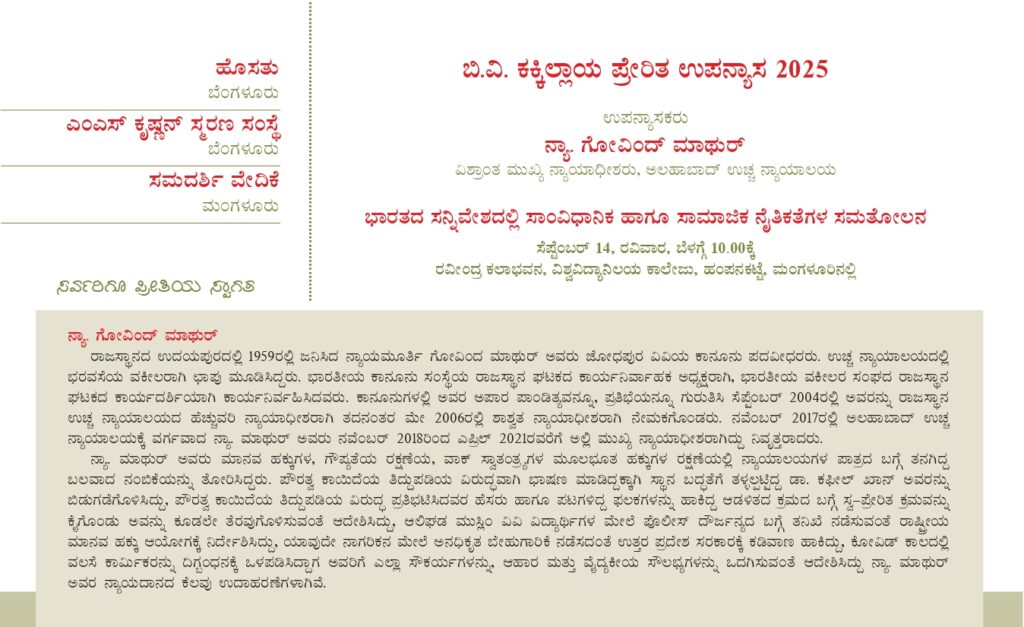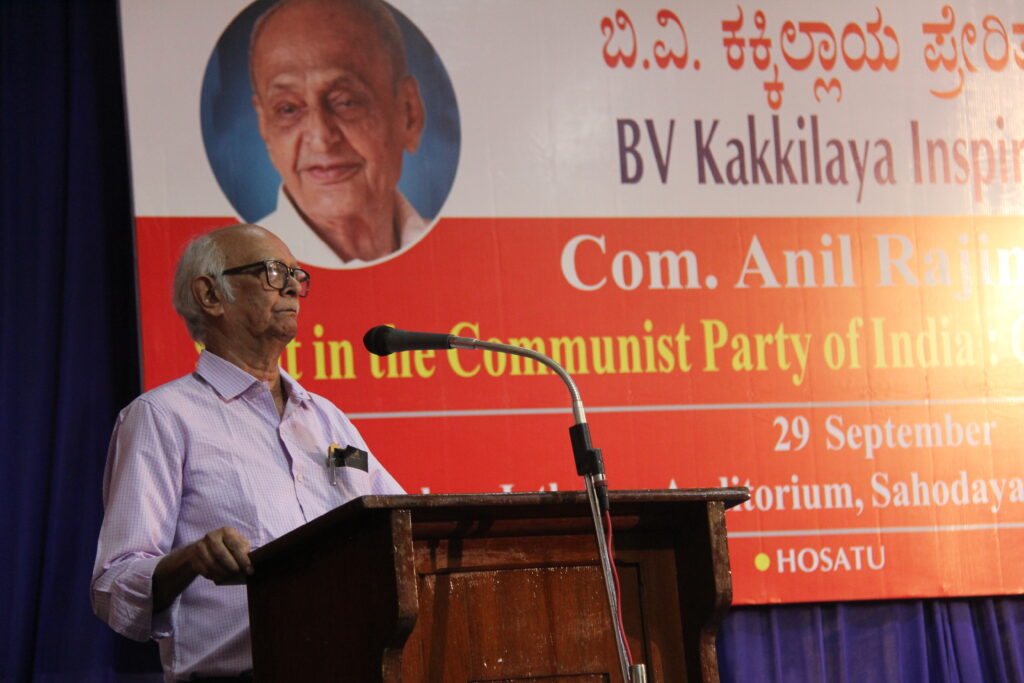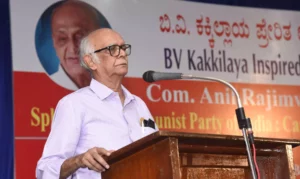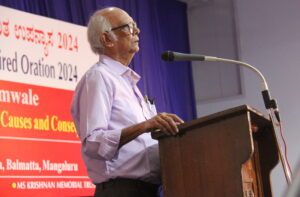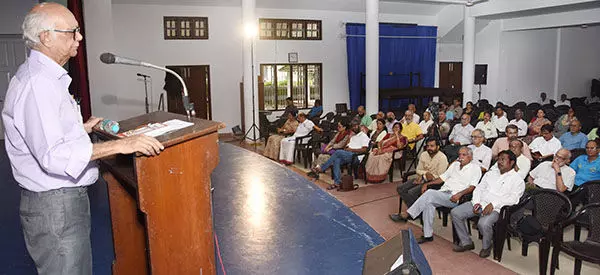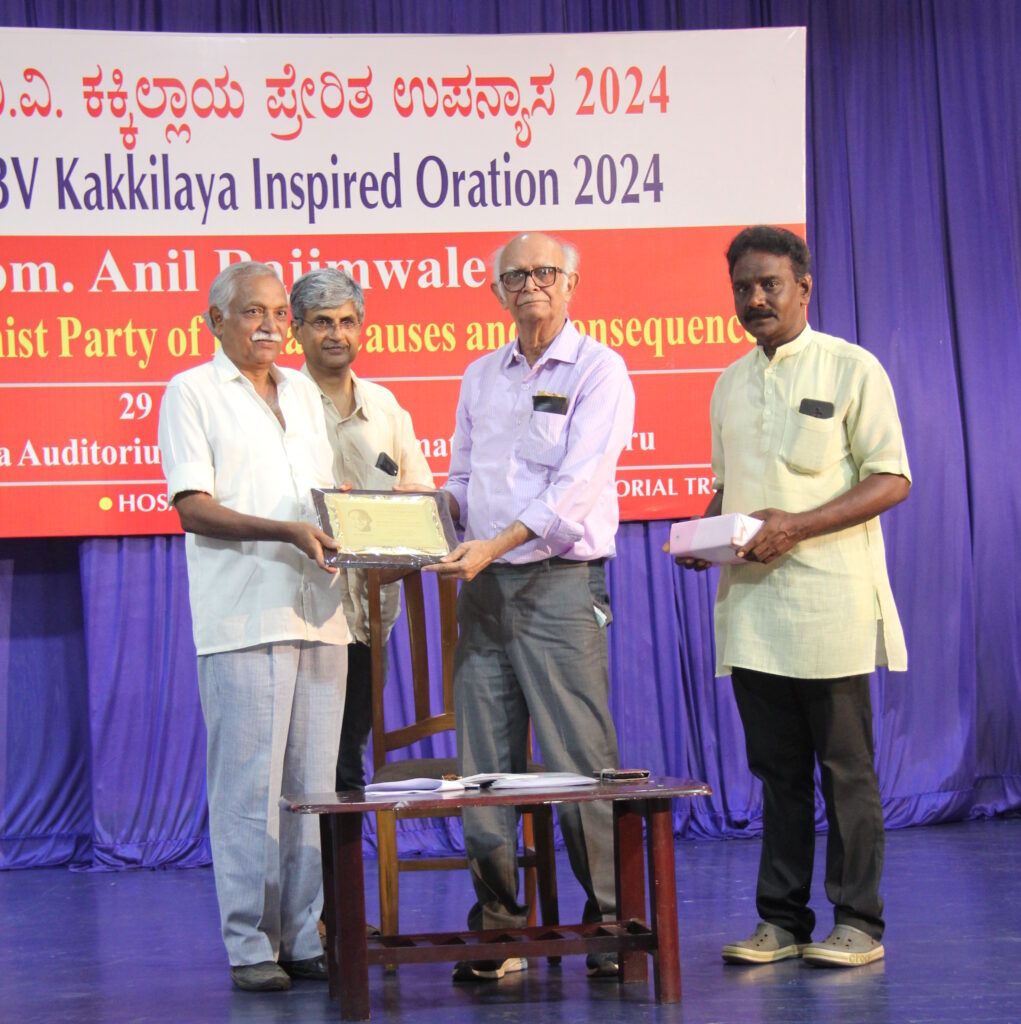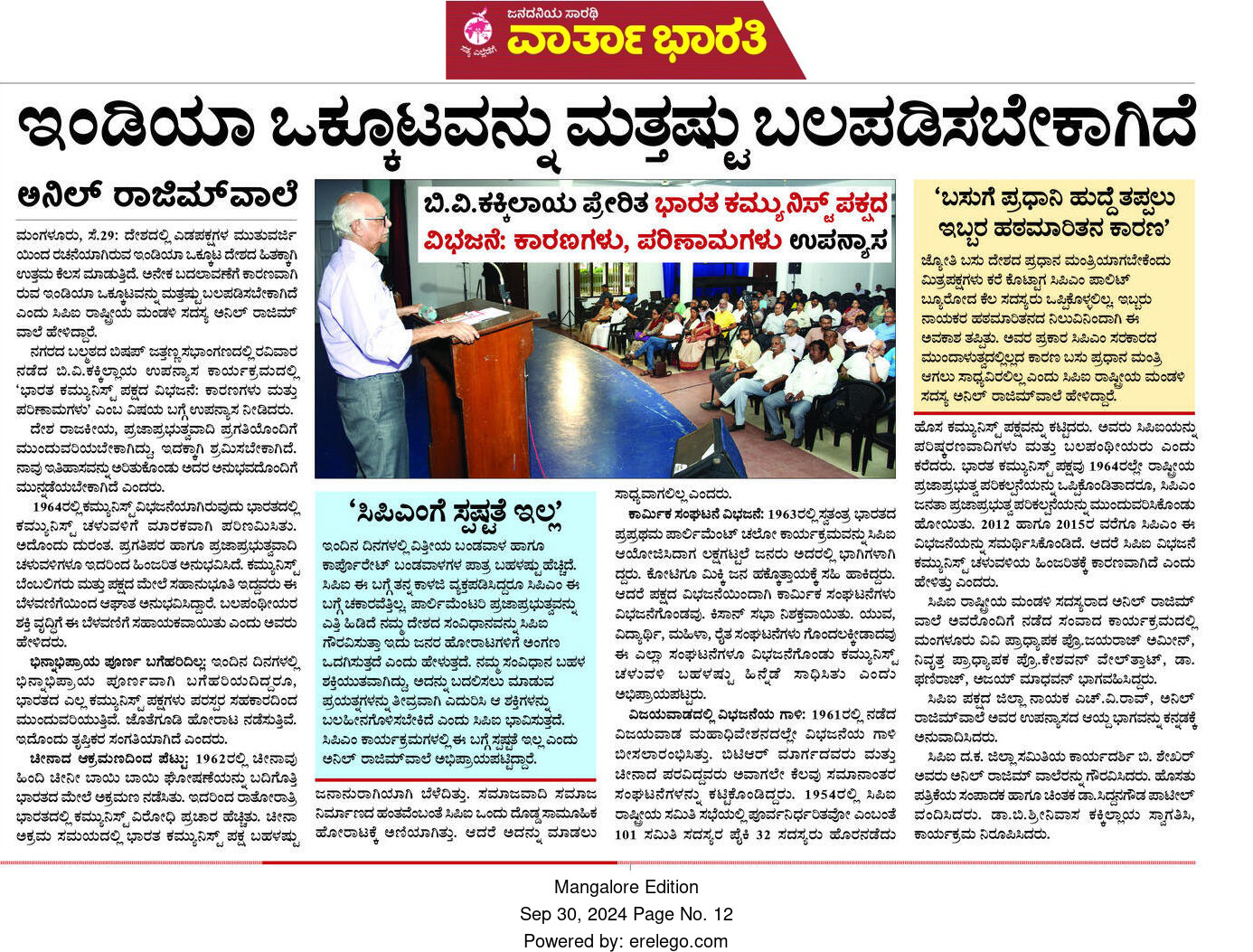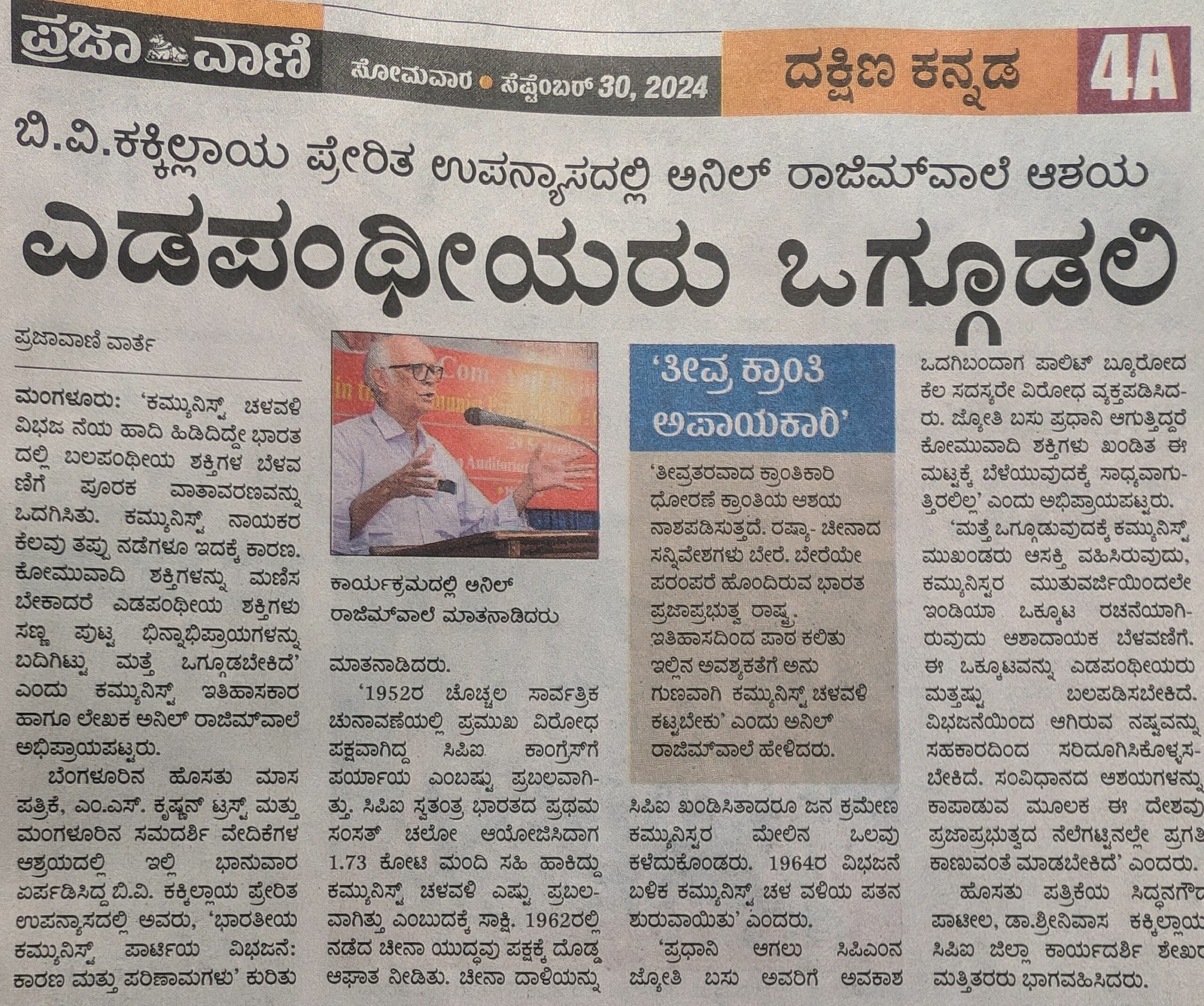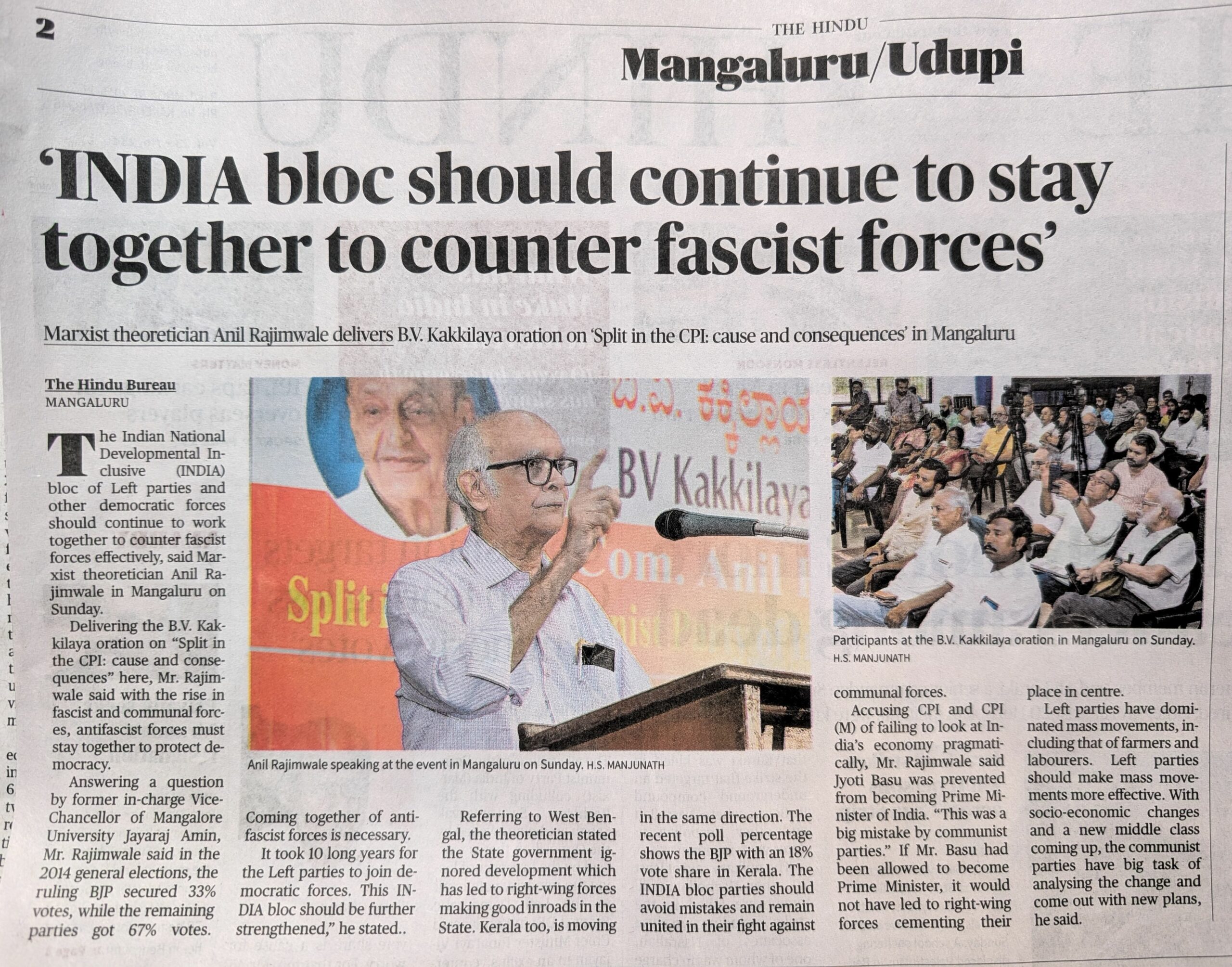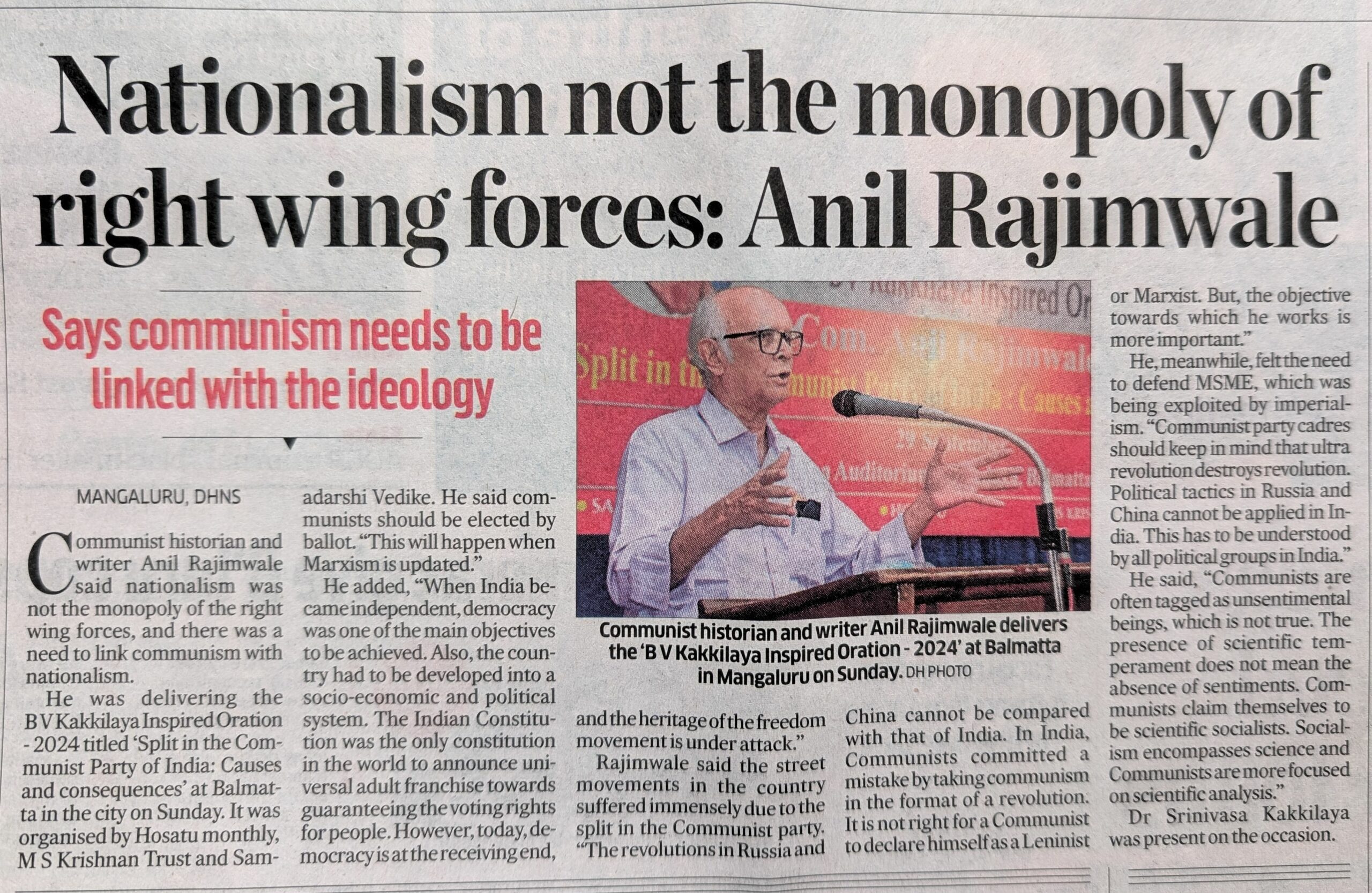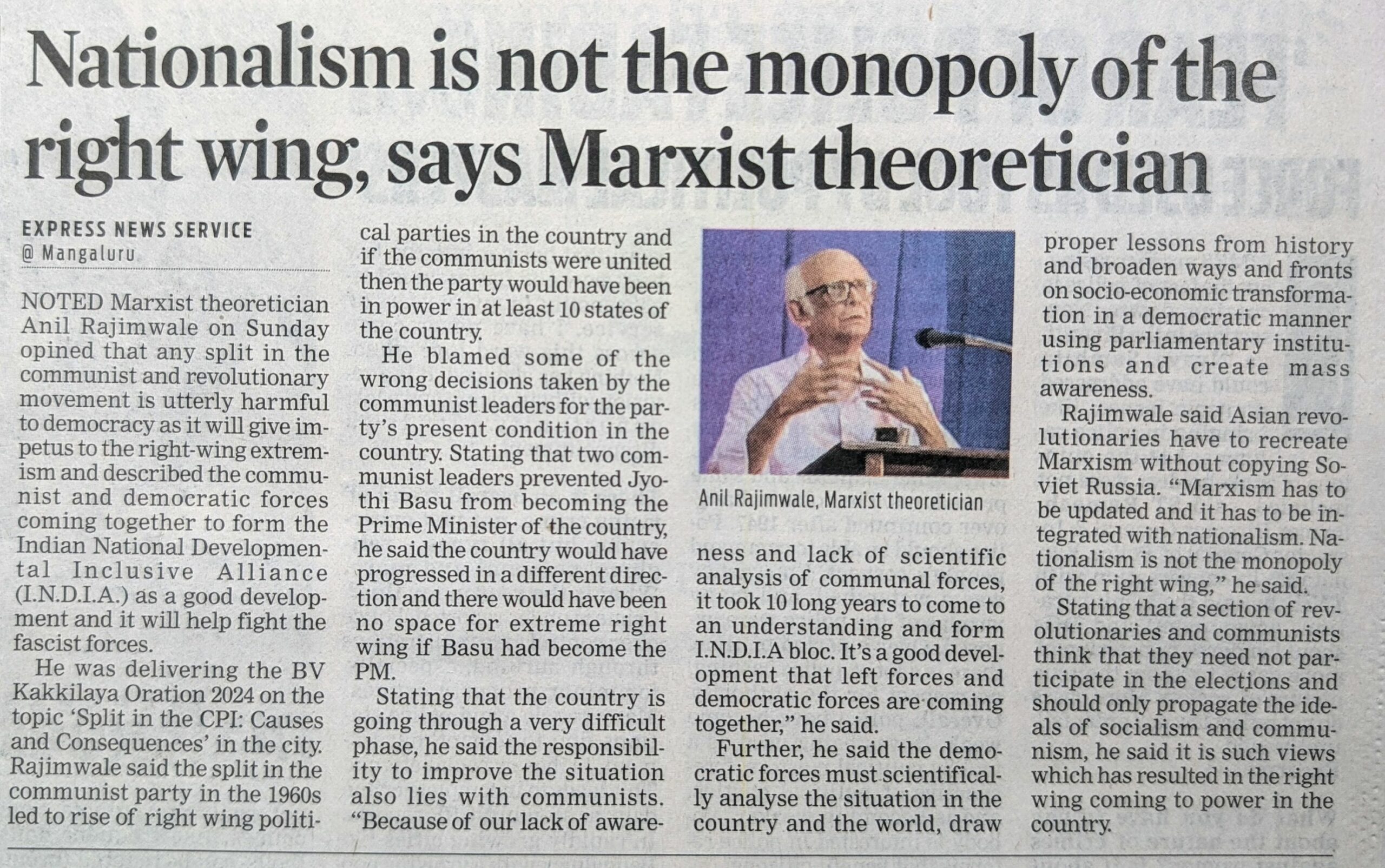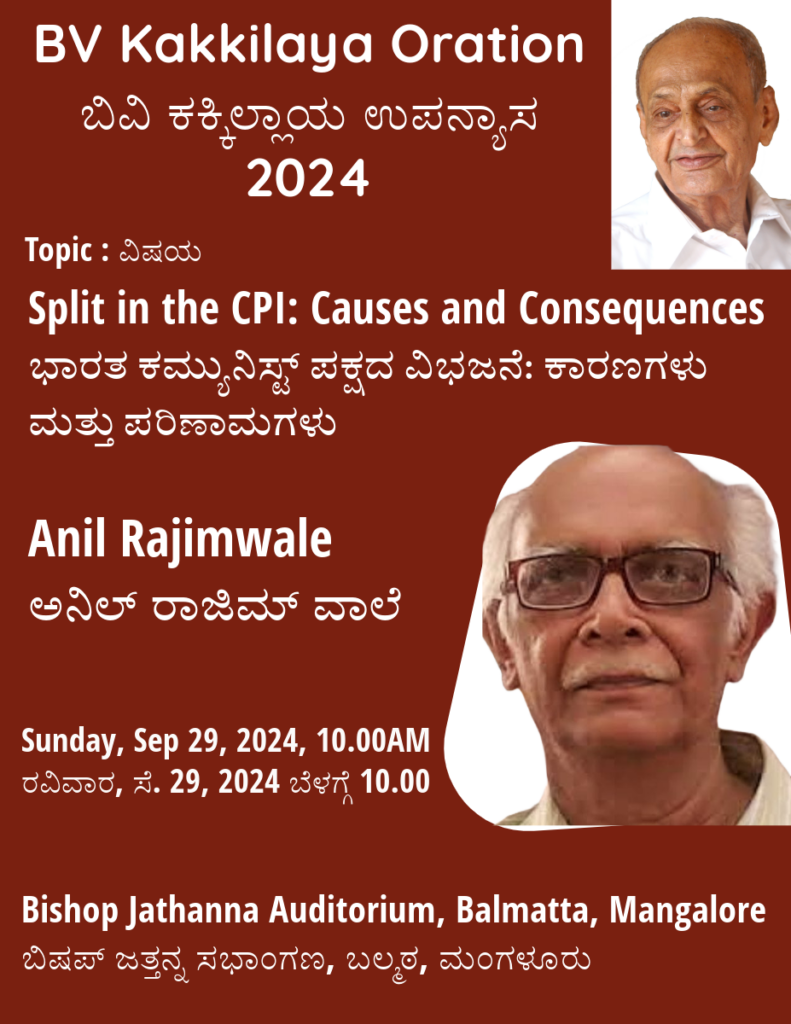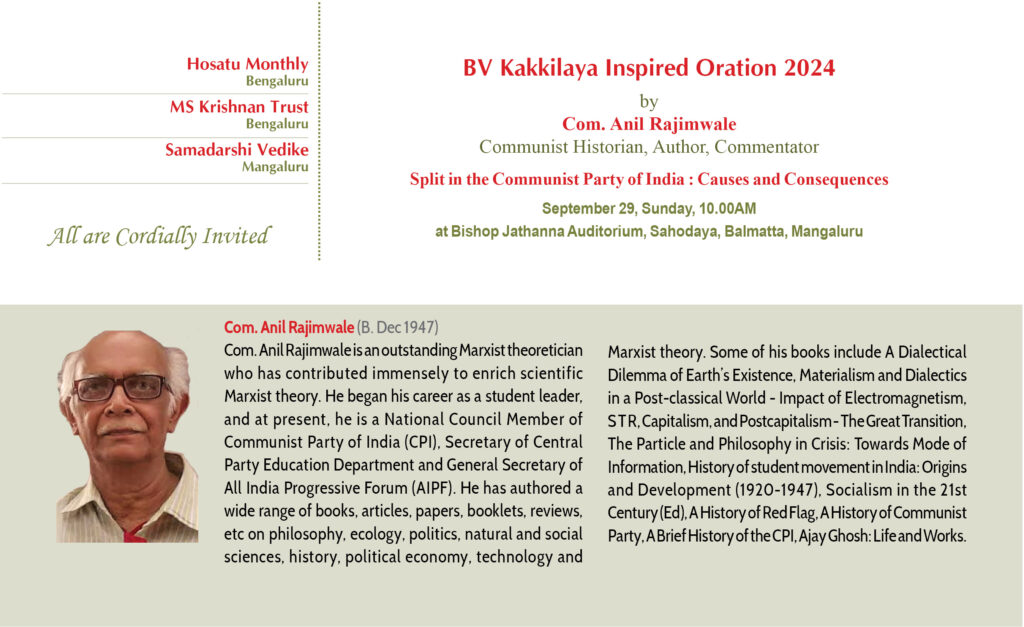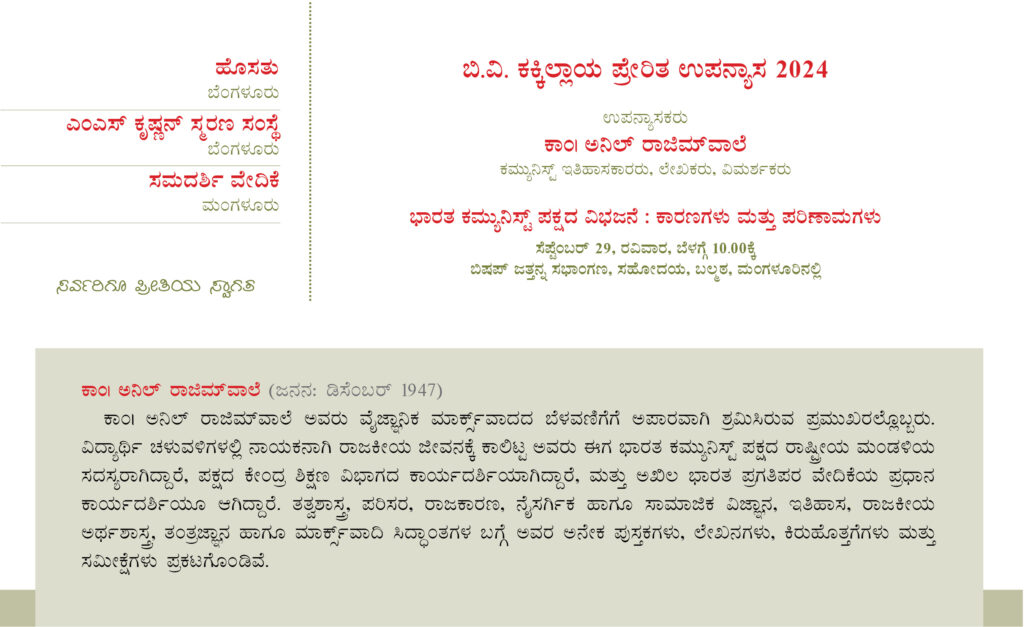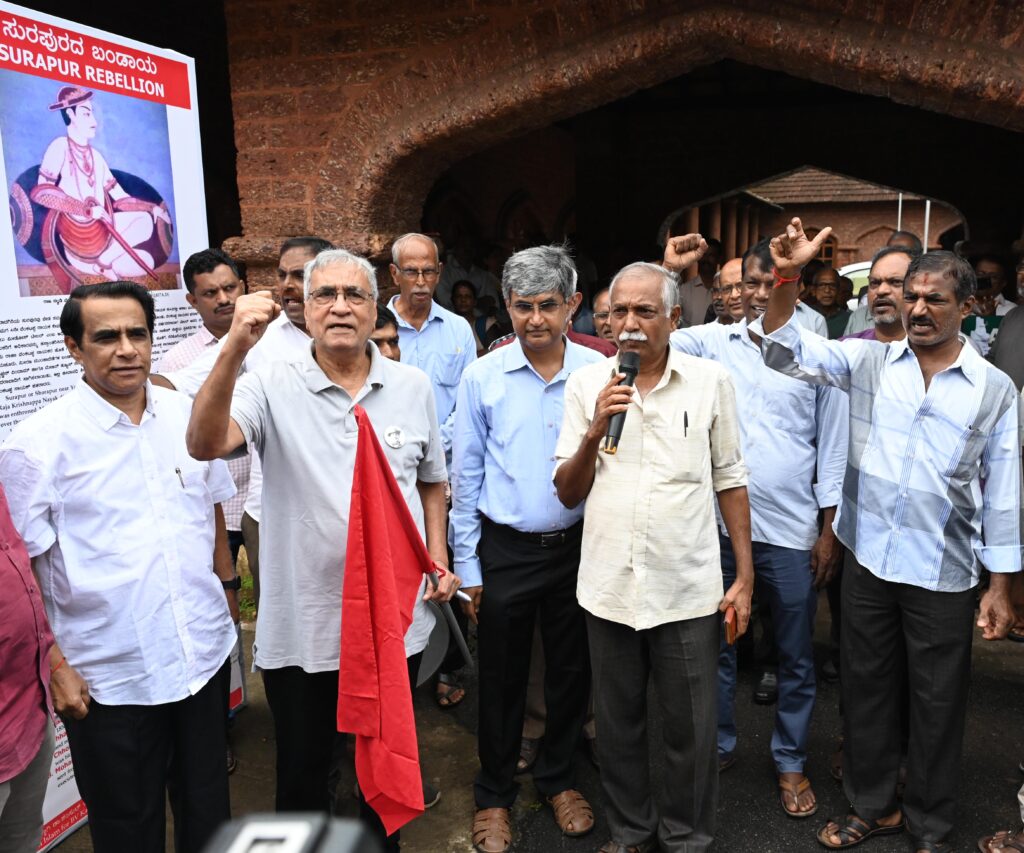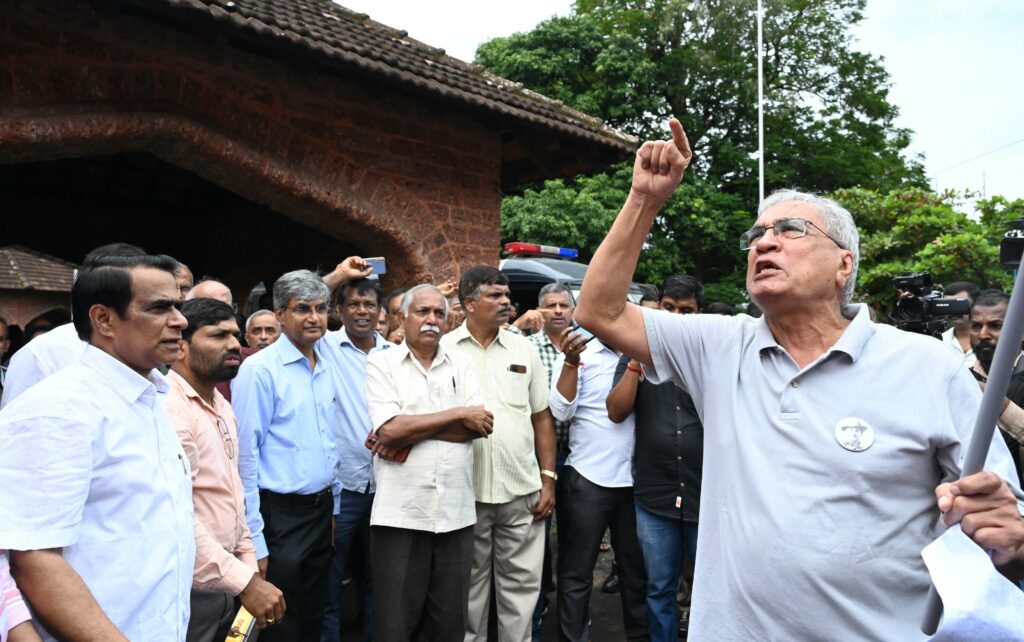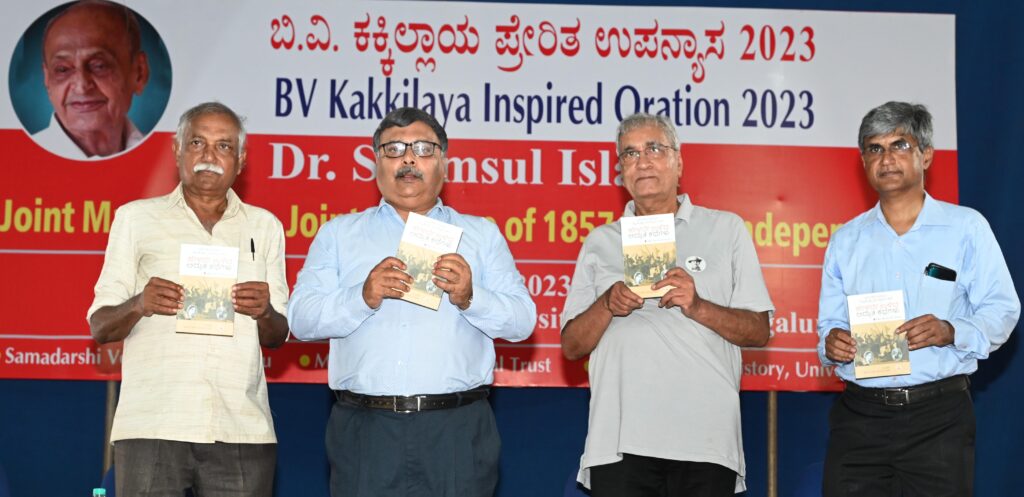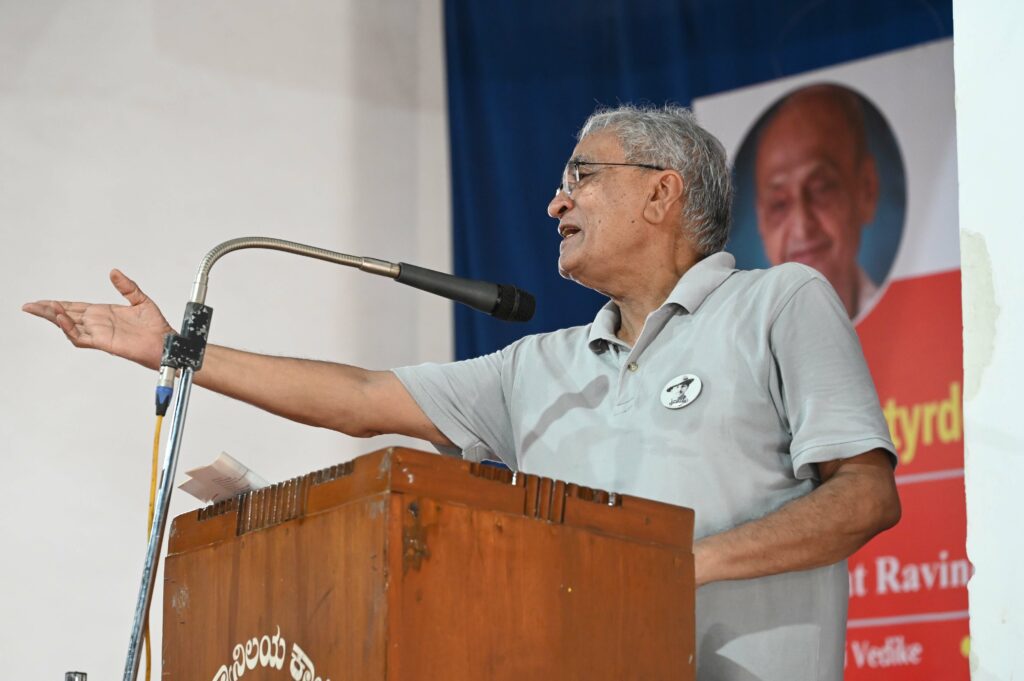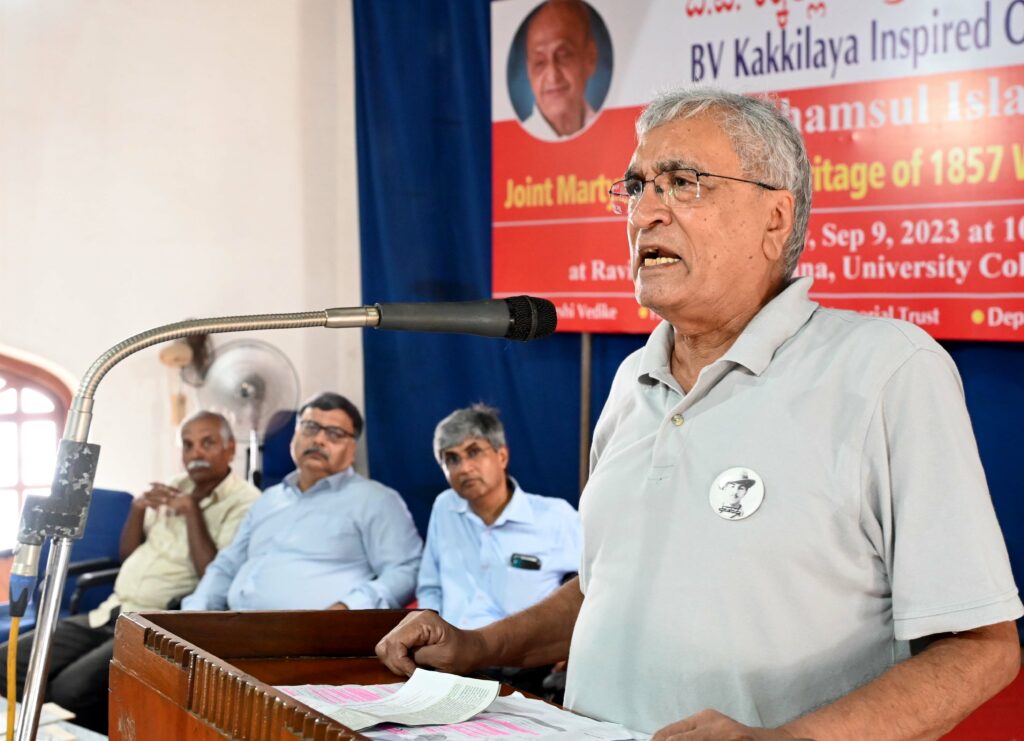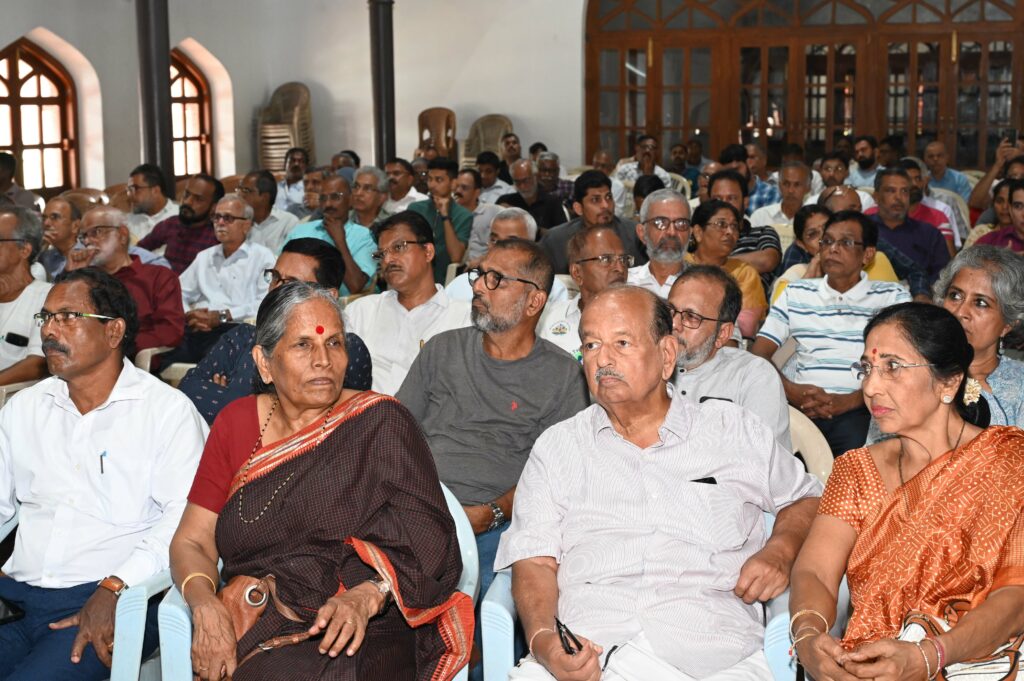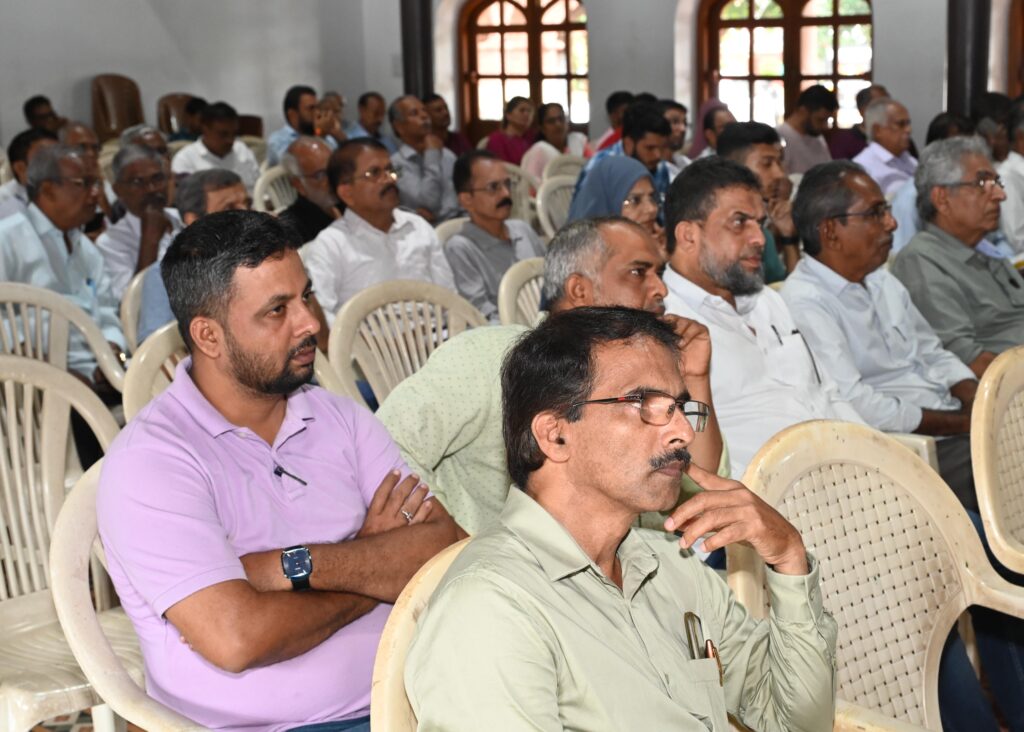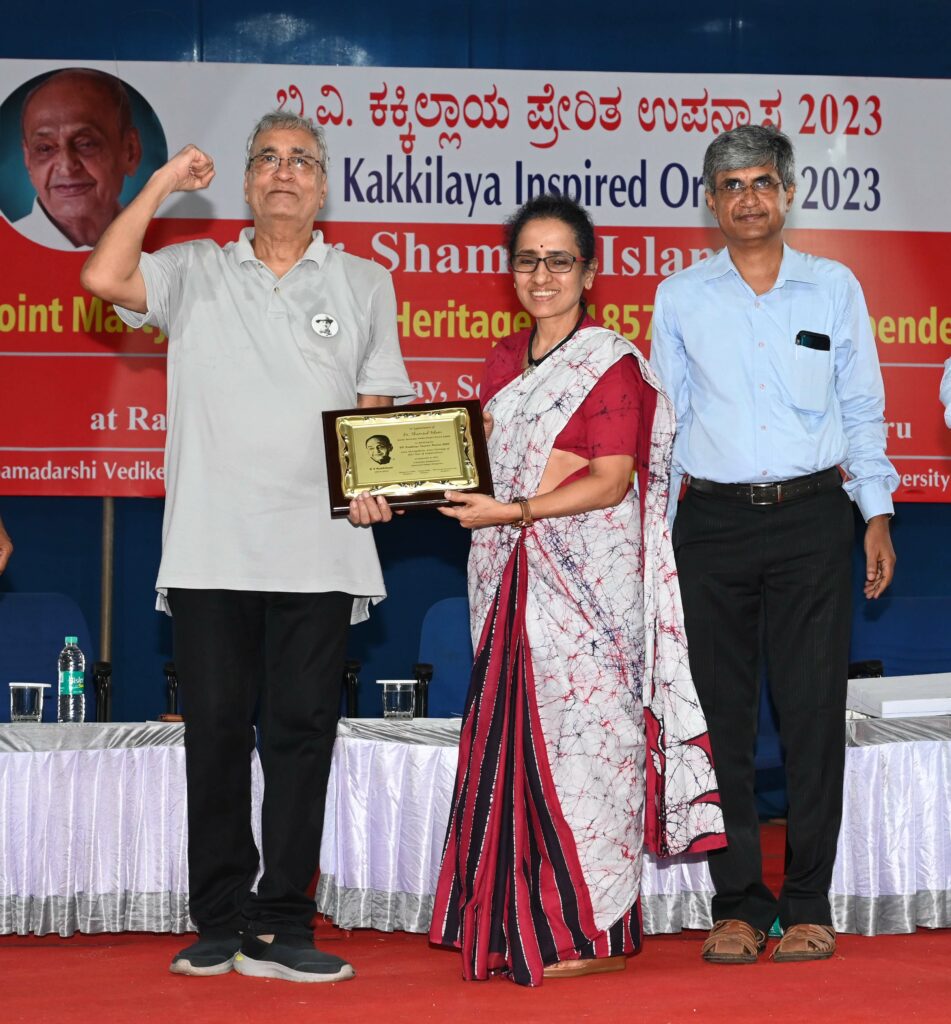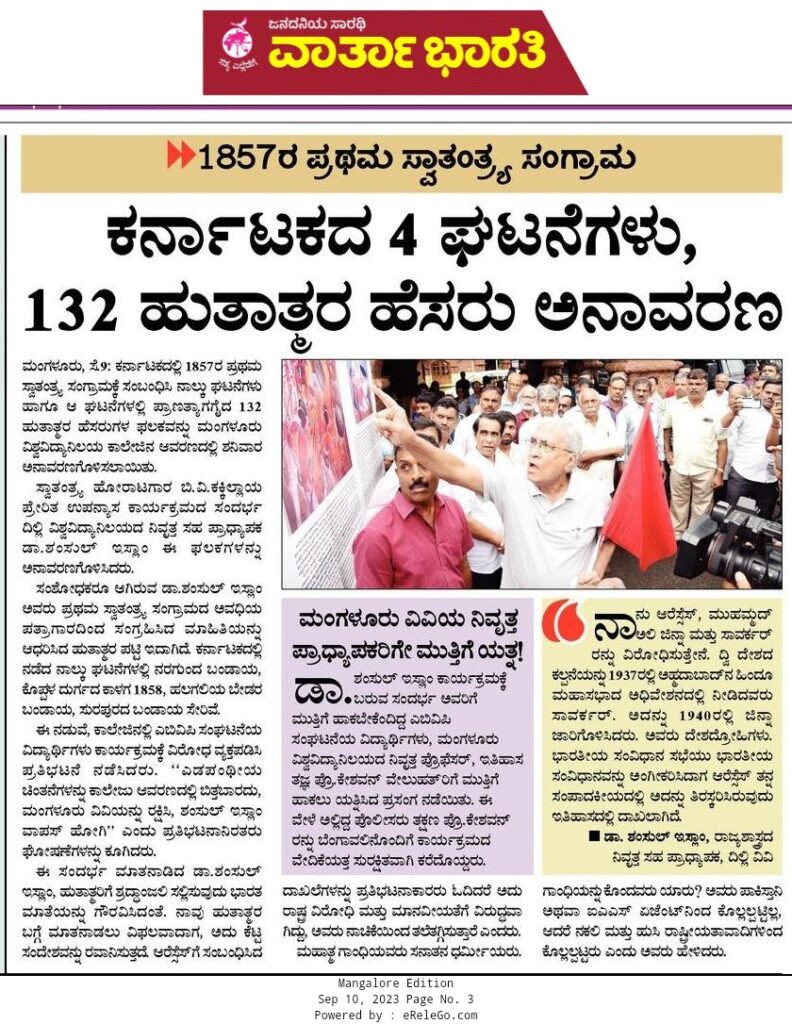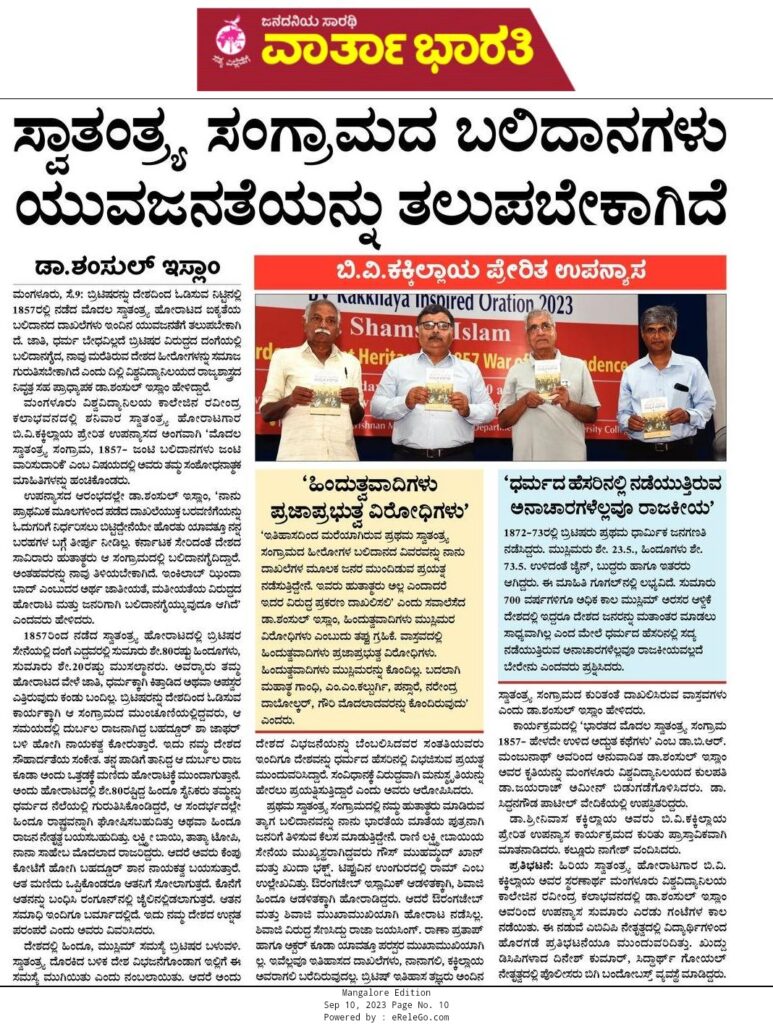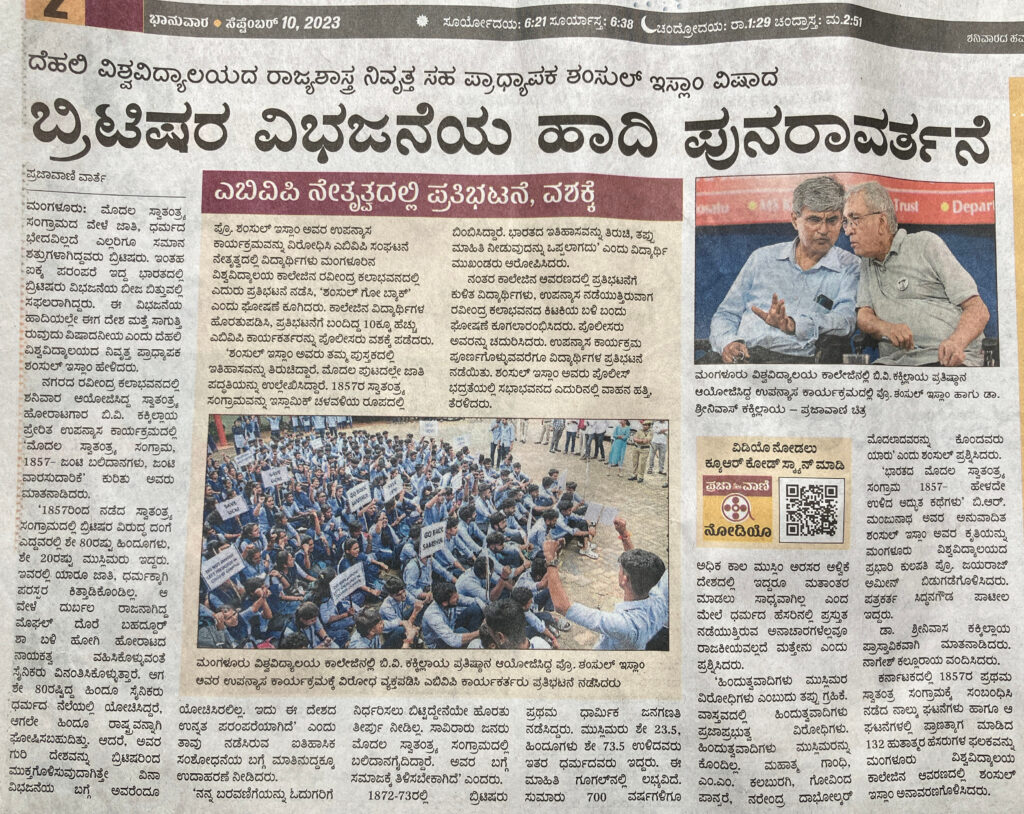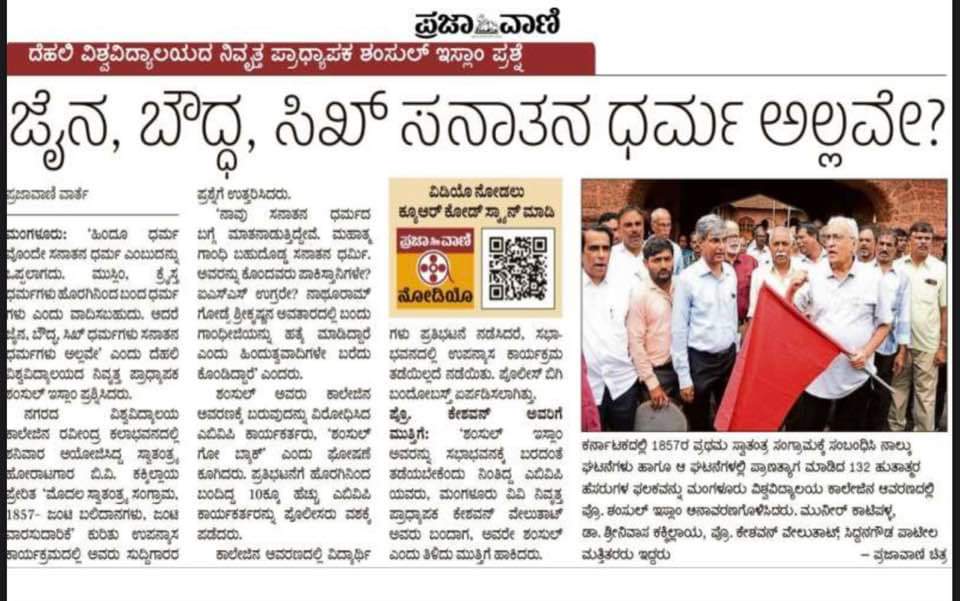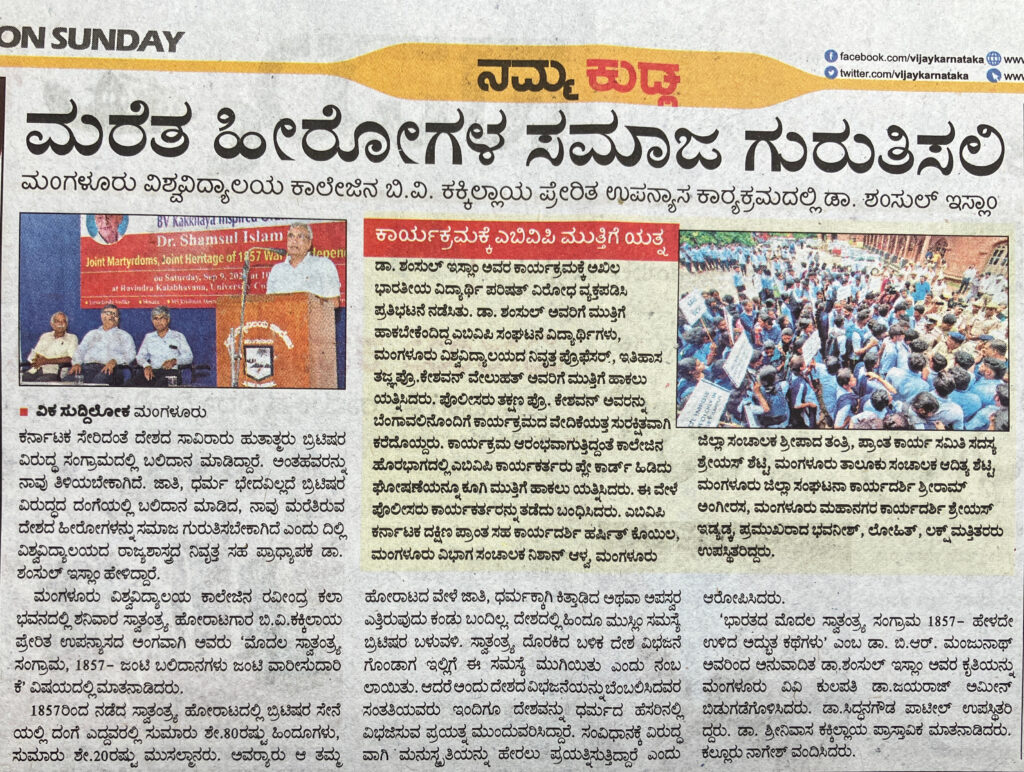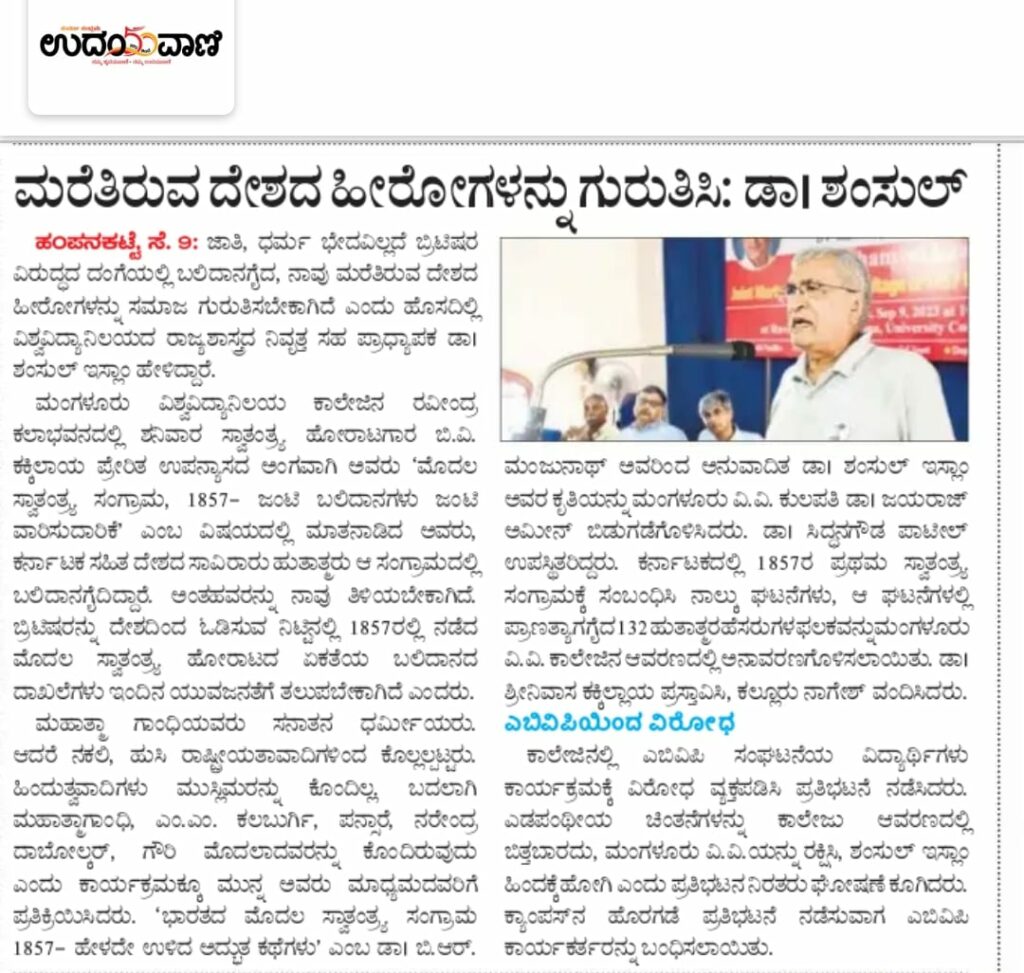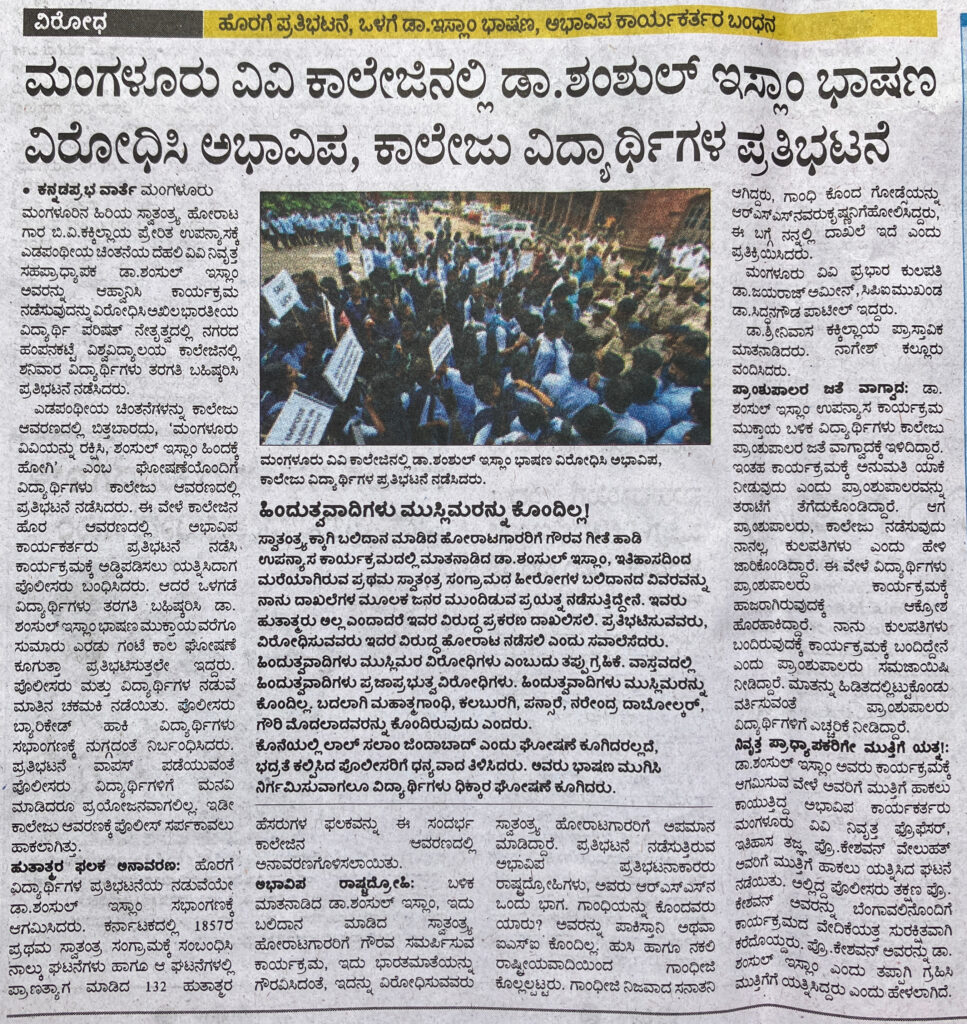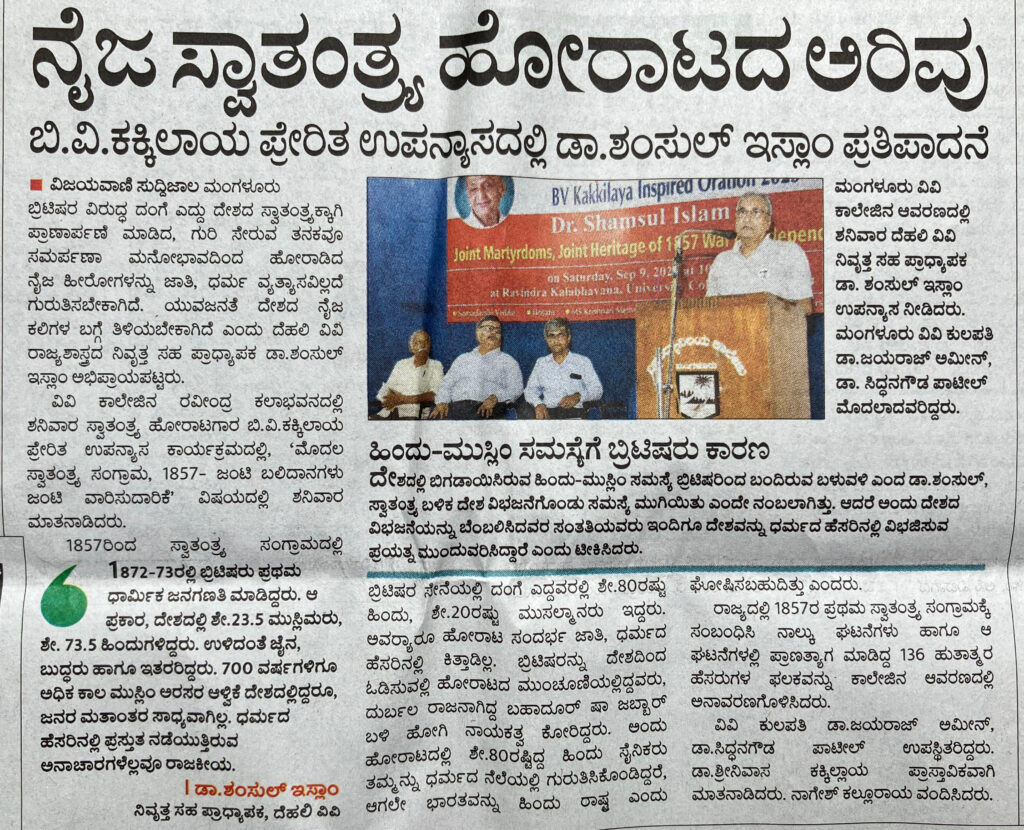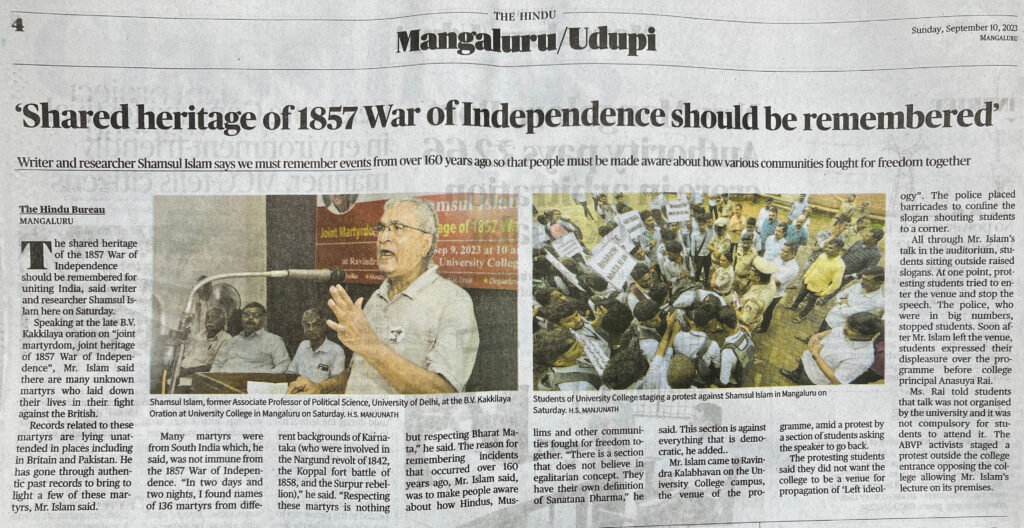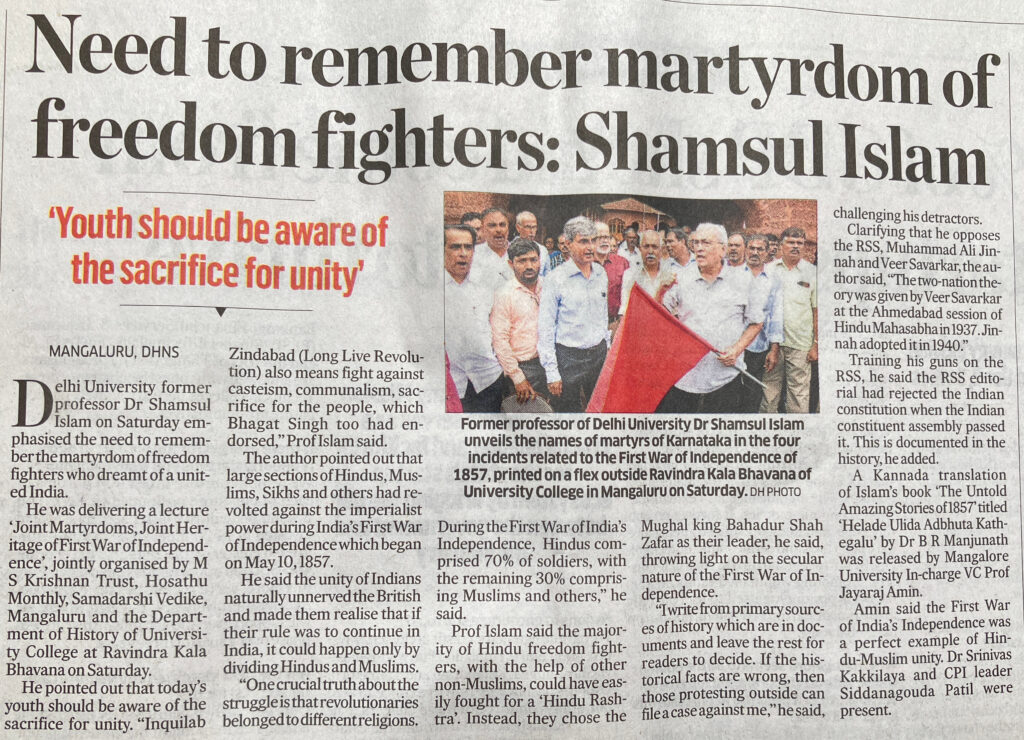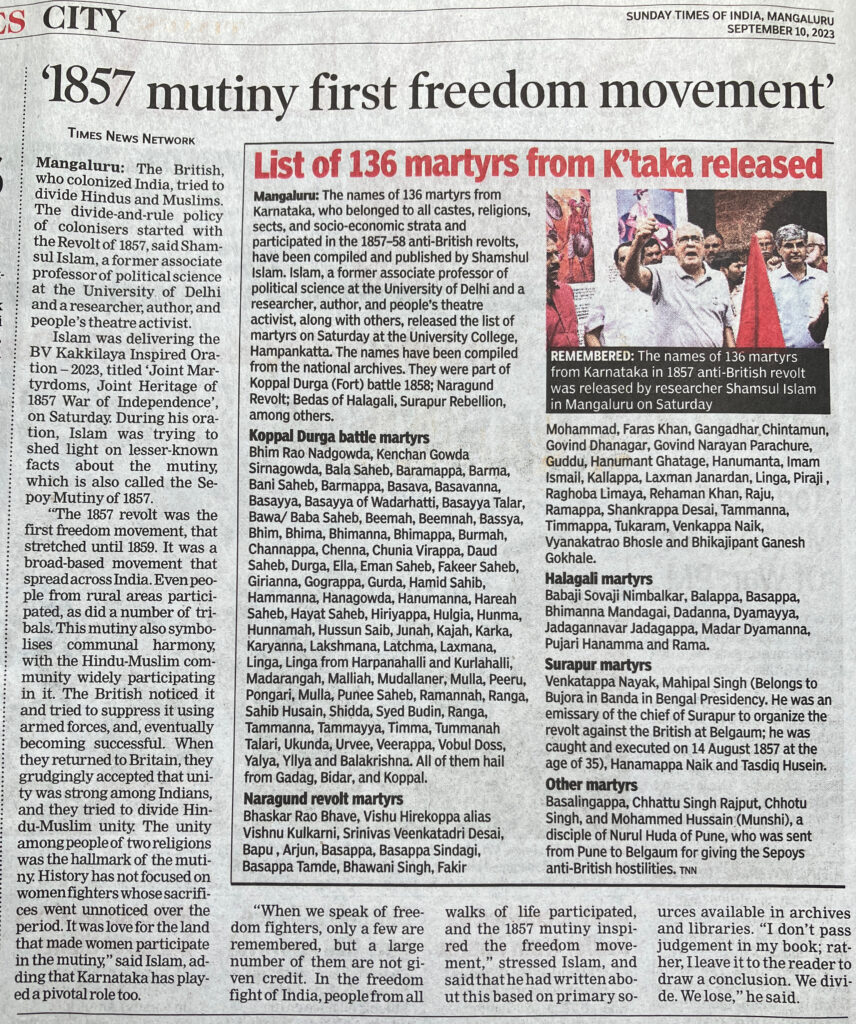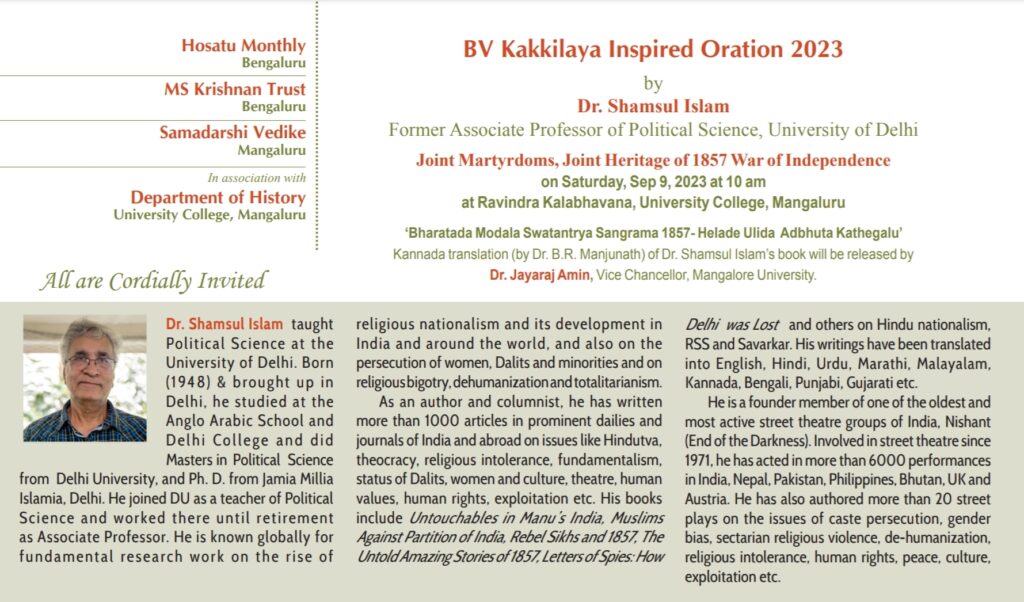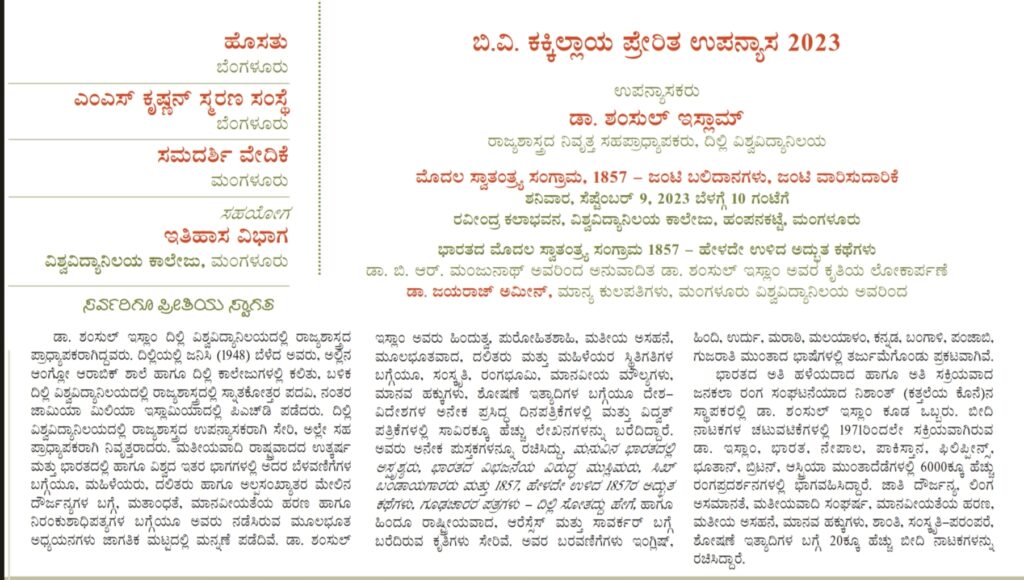BV Kakkilaya Inspired Oration – 2025
Balancing Constitutional and Social Morality in Indian Context
By Justiice Govind Mathur, Former Chief Justice, Allahabad High Court
on Sunday, September 14, 2025 at Raveendra Kalabhavana, University College, Mangaluru
BV Kakkilaya Inspired Oration – 2025, titled Balancing Constitutional and Social Morality in Indian Context, was delivered by Justice Govind Mathur, former Chief Justice of Allahabad High Court, on Sunday, September 14, 2025 at 10am at Raveendra Kalabhavana, University College, Balmatta, Mangaluru. It was well attended by intellectuals, academics, writers, lawyers and general public. The oration was organised under the aegis of Hosatu Monthly, Bangalore, MS Krishnan Trust, Bangalore, and Samadarshi Vedike, Mangalore.
The annual BV Kakkilaya Inspired Orations are being organised since 2013 as a tribute to the life and work of Sri BV Kakkilaya (1919-2012), and to promote alternative thought and approach to the problems of the suffering masses of our country.
Delivering the oration, Justice Govind Mathurephasised that the Constitution of India is supreme and its basic principles, including secularism, cannot be changed by anyone.
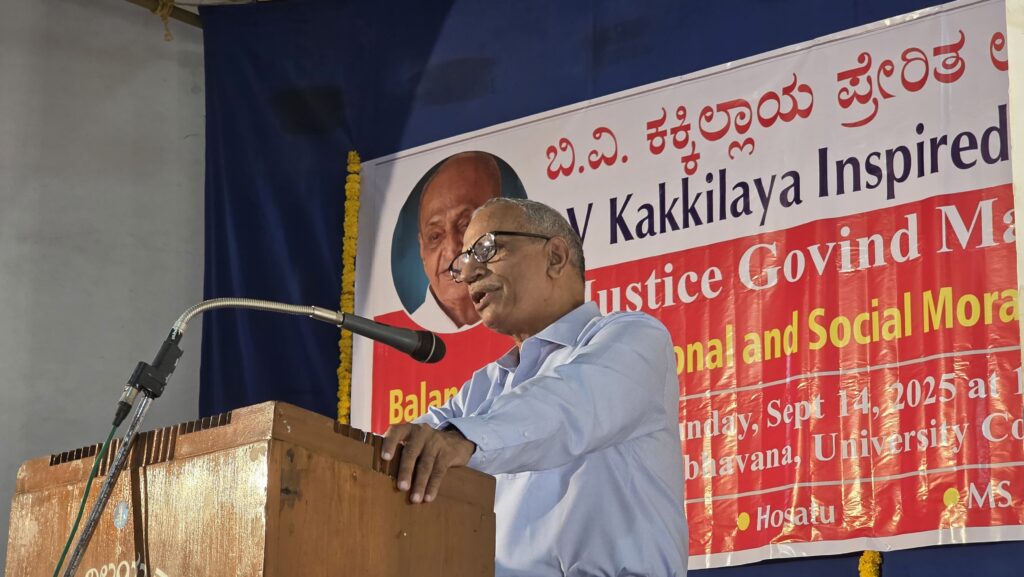 A summary of his oration is given below:
A summary of his oration is given below:
India’s freedom struggle was not just for liberation from British rule. Provinces that were under local princely rule and not the British rule, but like Rajasthan, Gwalior, Gujarat etc., also saw struggles for freedom. People across the country fought against the British and the monarchy, against colonialism and feudalism, against exploitation, against inequality and untouchability. Mahatma Gandhi, the foremost leader of the freedom movement, had also fought not only for freedom from British rule but also against untouchability and against the inequality of women. Not only political leaders but also social reformers and revolutionaries actively participated in the struggle for freedom from Britiosh rule as well as social evils.
After independence, the Constituent Assembly included representatives of all classes to realize these aspirations of the freedom struggle. Political leaders of the Congress and the Left parties, and others like Shyama Prasad Mukherjee from the Hindu Mahasabha were part of the Constituent Assembly. After deep deliberations, such a Constituent Assembly drafted a constitution that embodied the aspirations of the freedom struggle such as freedom, equality, fraternity, secularism, and intentions to defeat social evils such as untouchability, superstition, sectarianism, and atrocities on women. This constitutional morality embodies the supreme values applicable to all citizens of the country. As emphasised by Dr. Babasaheb Ambedkar on the eve of its adoption, our Constitution is not only a political and legal document, but also a social document.
There were and still are forces opposing constitutional morality. In the last two to three decades, the trend of rejecting constitutional morality has been strengthening. For this, the pretext of social and religious morality is being used. It is regrettable that all the social moralities that are glorified in this way are nothing but social ills. For example, the extremely inhumane practice of sati was banned in 1829 during the British rule. But in 1987, in Deorala, Rajasthan, Roop Kanwar, who was only 18 years old, was forced to consecrate herself on her husband’s pyre and her death was glorified. After that, the ban on glorification was added to the law prohibiting consecration of sati. But even now, every year on the day of Roop Kanwar’s murder, messages paying tribute to her as Sati Mata are filled in all the media, particularly the social media. Temples have been built in many parts of Rajasthan for her and others who committed Sati, and recently the number of visitors to them has increased to thousands. There is even a temple on a highway in Rajasthan where one can garland a motorbike and receive its prasad and blessings. Many such myths and superstitions are increasingly becoming social evils and are taking the form of morality. This is hurting the constitutional hope that it is the duty of citizens to develop a scientific mindset.
Bursting crackers during festivals and playing loud music are social problems. Although these are not part of our old rituals, they are being portrayed as such and argued as rights. We are seeing the Supreme Court and the judges being abused in various ways for asking why firecrackers are not only causing air pollution in Delhi but also across the country. The Supreme Court had banned the use of loud speakers after 10pm following a public interest litigation filed when a thirteen-year-old girl was sexually abused under the noise of loud music and died without anyone hearing her screams, but this order was opposed in the name of religious observances and the order itself was changed, allowing time till midnight and giving the local authorities the power to control, due to which the measures to control noise pollution were defeated. During the hearing of a petition challenging the order to display the names of shopkeepers on the roads during the Kanwar Yatra in Uttar Pradesh, the government itself put forward unscientific arguments before the court that the Yatra would benefit the environment. Thus, it is worrying that the trend of justifying social evils and polluting practices and abusing the laws and courts that prevent them is increasing. The tactics of attacking and pressuring the courts that protect constitutional morality in the name of social morality and practices are dangerous.
Today, the struggles against anti-constitutional social evils are declining or non-existent. Instead, the trend of filing public interest petitions in the courts to prevent the social evils and expecting relief from the courts is increasing. It is essential and everyone’s responsibility to organize strong struggles against social evils.
ಈ ವರ್ಷ 2025ರ ಬಿವಿ ಕಕ್ಕಿಲ್ಲಾಯ ಪ್ರೇರಿತ ಉಪನ್ಯಾಸವು ಸೆಪ್ಟೆಂಬರ್ 14ರಂದು ಮಂಗಳೂರಿನ ವಿಶ್ವವಿದ್ಯಾಲಯ ಕಾಲೇಜಿನ ರವೀಂದ್ರ ಕಲಾಭವನದಲ್ಲಿ ನಡೆಯಿತು. ಭಾರತದಲ್ಲಿ ಸಾಂವಿಧಾನಿಕ ಮತ್ತು ಸಾಮಾಜಿಕ ನೈತಿಕತೆಗಳ ಸಮತೋಲನ ಎಂಬ ವಿಷಯದ ಬಗ್ಗೆ ಮಾತಾಡಿದ ಅಲಹಾಬಾದ್ ಉಚ್ಚ ನ್ಯಾಯಾಲಯದ ವಿಶ್ರಾಂತ ಮುಖ್ಯ ನ್ಯಾಯಾಧೀಶರಾದ ನ್ಯಾ. ಗೋವಿಂದ ಮಾಥುರ್ ಅವರು ಭಾರತದ ಸಂವಿಧಾನವು ಪರಮೋಚ್ಛವಾಗಿದ್ದು, ಜಾತ್ಯತೀತತೆಯೂ ಸೇರಿದಂತೆ ಅದರ ಮೂಲ ಆಶಯಗಳನ್ನು ಯಾರಿಂದಲೂ ಬದಲಾಯಿಸಲು ಸಾಧ್ಯವಿಲ್ಲ ಎಂದರು.
ಅವರ ಉಪನ್ಯಾಸದ ಸಾರಾಂಶ ಇಲ್ಲಿದೆ:
ಭಾರತದ ಸ್ವಾತಂತ್ರ್ಯ ಸಂಗ್ರಾಮವು ಕೇವಲ ಬ್ರಿಟಿಷ್ ಆಳ್ವಿಕೆಯಿಂದ ವಿಮೋಚನೆಗಾಗಿ ಮಾತ್ರವೇ ಆಗಿರಲಿಲ್ಲ. ರಾಜಸ್ಥಾನದಂತಹ ಬ್ರಿಟಿಷ್ ಆಡಳಿತದಡಿ ಇಲ್ಲದೇ ಸ್ಥಳೀಯ ರಾಜಾಳ್ವಿಕೆಯಡಿ ಇದ್ದ ಪ್ರದೇಶಗಳಲ್ಲೂ ಸ್ವಾತಂತ್ರ್ಯ ಸಂಗ್ರಾಮಗಳು ನಡೆದಿದ್ದವು. ಒಟ್ಟಿನಲ್ಲಿ ದೇಶದಾದ್ಯಂತ ಜನರು ಬ್ರಿಟಿಷ್ ಹಾಗೂ ರಾಜಸತ್ತೆಯ ವಿರುದ್ಧವಾಗಿ, ಪಾಳೆಯಗಾರಿಕೆ ಹಾಗೂ ಊಳಿಗಮಾನ್ಯ ವ್ಯವಸ್ಥೆಯ ವಿರುದ್ಧವಾಗಿ, ಶೋಷಣೆಯ ವಿರುದ್ಧವಾಗಿ, ಅಸಮಾನತೆ ಹಾಗೂ ಅಸ್ಪೃಶ್ಯತೆಯ ವಿರುದ್ಧವಾಗಿ ಹೋರಾಡಿದ್ದರು. ಸ್ವಾತಂತ್ರ್ಯ ಚಳುವಳಿಯ ಅಗ್ರಗಣ್ಯ ನಾಯಕರಾಗಿದ್ದ ಮಹಾತ್ಮ ಗಾಂಧಿಯವರೂ ಕೂಡ ಬ್ರಿಟಿಷ್ ಆಳ್ವಿಕೆಯಿಂದ ಸ್ವಾತಂತ್ರ್ಯಕ್ಕಷ್ಟೇ ಅಲ್ಲದೆ ಅಸ್ಪೃಶ್ಯತೆಯ ವಿರುದ್ಧ, ಮಹಿಳಾ ಅಸಮಾನತೆಯ ವಿರುದ್ಧವೂ ಹೋರಾಡಿದ್ದರು. ಸ್ವಾತಂತ್ರ್ಯ ಸಂಗ್ರಾಮದಲ್ಲಿ ರಾಜಕೀಯ ನಾಯಕರು ಮಾತ್ರವೇ ಅಲ್ಲದೆ ಸಮಾಜ ಸುಧಾರಕರು, ಕ್ರಾಂತಿಕಾರಿಗಳು ಕೂಡ ಸಕ್ರಿಯವಾಗಿ ಭಾಗಿಯಾಗಿದ್ದರು.
ಸ್ವಾತಂತ್ರ್ಯಾನಂತರ ಈ ಆಶಯಗಳನ್ನು ಸಾಕಾರಗೊಳಿಸುವುದಕ್ಕಾಗಿ ಸಂವಿಧಾನ ರಚನಾ ಸಭೆಯಲ್ಲೂ ಎಲ್ಲಾ ವರ್ಗಗಳ ಪ್ರತಿನಿಧಿಗಳು ಪ್ರಾತಿನಿಧ್ಯ ಪಡೆದಿದ್ದರು. ಕಾಂಗ್ರೆಸ್ ಹಾಗೂ ಎಡ ಪಕ್ಷಗಳ ರಾಜಕೀಯ ನಾಯಕರು, ಹಿಂದೂ ಮಹಾ ಸಭಾದಂತಹ ಸಂಘಟನೆಗಳಿಂದ ಶ್ಯಾಮ ಪ್ರಸಾದ್ ಮುಖರ್ಜಿಯಂತವರು ಸಂವಿಧಾನ ಸಭೆಯಲ್ಲಿದ್ದರು. ಇಂತಹ ಸಂವಿಧಾನ ಸಭೆಯು ಆಳವಾದ ಚರ್ಚೆಗಳ ಬಳಿಕ ಸ್ವಾತಂತ್ರ್ಯ ಸಂಗ್ರಾಮದ ಆಶಯಗಳಾದ ಸ್ವಾತಂತ್ರ್ಯ, ಸಮಾನತೆ, ಭ್ರಾತೃತ್ವ, ಮತ ನಿರಪೇಕ್ಷತೆಗಳನ್ನೊಳಗೊಂಡ, ಅಸ್ಪೃಶ್ಯತೆ, ಮೂಢ ನಂಬಿಕೆ, ಮತೀಯವಾದ, ಮಹಿಳೆಯರ ಮೇಲೆ ದೌರ್ಜನ್ಯಗಳಂತಹ ಸಾಮಾಜಿಕ ಪಿಡುಗುಗಳನ್ನು ತಿರಸ್ಕರಿಸುವ ಸಂವಿಧಾನವನ್ನು ರಚಿಸಲಾಯಿತು. ಇವುಗಳೇ ಸಾಂವಿಧಾನಿಕ ನೈತಿಕತೆಯಾಗಿದ್ದು, ದೇಶದ ಎಲ್ಲಾ ನಾಗರಿಕರಿಗೆ ಅನ್ವಯಿಸುವ ಪರಮೋಚ್ಚ ಮೌಲ್ಯಗಳಾಗಿವೆ. ಡಾ. ಬಾಬಾ ಸಾಹೇಬ್ ಅಂಬೇಡ್ಕರ್ ಅವರು ಸಂವಿಧಾನ ಅಂಗೀಕಾರದ ಹಿಂದಿನ ದಿನ ಹೇಳಿದ್ದಂತೆ ನಮ್ಮ ಸಂವಿಧಾನವು ಕೇವಲ ರಾಜಕೀಯ ಹಾಗೂ ನ್ಯಾಯಿಕ ಸಂಹಿತೆಯಷ್ಟೇ ಅಲ್ಲ, ಸಾಮಾಜಿಕ ಸಂಹಿತೆಯೂ ಆಗಿದೆ.
ಸಾಂವಿಧಾನಿಕ ಮೌಲ್ಯಗಳನ್ನು ವಿರೋಧಿಸುವ ಶಕ್ತಿಗಳು ಅಂದೂ ಇದ್ದವು, ಈಗಲೂ ಇವೆ. ಕಳೆದ ಎರಡು ಮೂರು ದಶಕಗಳಲ್ಲಿ ಸಾಂವಿಧಾನಿಕ ನೈತಿಕತೆಯನ್ನು ತಿರಸ್ಕರಿಸುವ ಪ್ರವೃತ್ತಿಯು ಬಲಗೊಳ್ಳುತ್ತಿದೆ. ಇದಕ್ಕಾಗಿ ಸಾಮಾಜಿಕ, ಧಾರ್ಮಿಕ ನೈತಿಕತೆಗಳ ನೆಪವನ್ನು ಬಳಸಿಕೊಳ್ಳಲಾಗುತ್ತಿದೆ. ಹೀಗೆ ವೈಭವೀಕರಿಸುವ ಸಾಮಾಜಿಕ ನೈತಿಕತೆಗಳೆಲ್ಲವೂ ಸಾಮಾಜಿಕ ಪಿಡುಗಗಳೇ ಆಗಿವೆ ಎನ್ನುವುದು ಖೇದನೀಯವಾಗಿದೆ. ಉದಾಹರಣೆಗೆ, ತೀರಾ ಅಮಾನವೀಯವಾದ ಸತಿಸಹಮನ ಪದ್ಧತಿಯನ್ನು 1829ರಲ್ಲಿ ಬ್ರಿಟಿಷ್ ಆಡಳಿತದಲ್ಲೇ ನಿಷೇಧಿಸಲಾಗಿತ್ತು. ಆದರೆ 1987ರಲ್ಲಿ ರಾಜಸ್ಥಾನದ ದೇವೋರಾಲಾದಲ್ಲಿ ಕೇವಲ 18ರಾ ವಯಸ್ಸಿನ ರೂಪ್ ಕನ್ವರ್ ಅವರನ್ನು ಪತಿಯ ಚಿತೆಯಲ್ಲಿ ಸಹಗಮನಕ್ಕೆ ದೂಡಲಾಯಿತು, ವೈಭವೀಕರಿಸಲಾಯಿತು. ಅದಾದ ಬಳಿಕ ಸತಿ ಸಹಗಮನವನ್ನು ನಿಷೇಧಿಸುವ ಕಾಯಿದೆಯ ಜೊತೆಗೆ ವೈಭವೀಕರಣದ ನಿಷೇಧವನ್ನೂ ಸೇರಿಸಲಾಯಿತು. ಆದರೆ ಈಗಲೂ ಪ್ರತೀ ವರ್ಷ ರೂಪ್ ಕನ್ವರ್ ಹತರಾದ ದಿನದಂದು ಆಕೆಗೆ ಸತಿಮಾತೆ ಎಂದು ಶ್ರದ್ಧಾಂಜಲಿ ಸಲ್ಲಿಸುವ ಸಂದೇಶಗಳು ಎಲ್ಲಾ ಮಾಧ್ಯಮಗಳಲ್ಲಿ ತುಂಬಿಕೊಂಡಿರುತ್ತವೆ. ರಾಜಸ್ಥಾನದ ಅನೇಕ ಕಡೆ ಅಲ್ಲಲ್ಲಿ ಆಕೆಗೂ, ಸತಿ ಸಹಗಮನ ಮಾಡಿಕೊಂಡ ಇತರರಿಗೂ ಗುಡಿಗಳನ್ನು ಕಟ್ಟಲಾಗಿದ್ದು, ಇತ್ತೀಚೆಗೆ ಅವುಗಳಿಗೆ ಭೇಟಿ ನೀಡುವವರ ಸಂಖ್ಯೆಯು ಸಾವಿರಕ್ಕೇರುತ್ತಿದೆ. ರಾಜಸ್ಥಾನದ ಹೆದ್ದಾರಿಯೊಂದರಲ್ಲಿ ಮೋಟಾರ್ ಬೈಕ್ ಒಂದಕ್ಕೆ ಮಾಲೆ ಹಾಕಿ ಅದರ ಪ್ರಸಾದ ಪಡೆಯುವ ಮಂದಿರವೂ ಇದೆ. ಇಂಥ ಅನೇಕ ಕಂದಾಚಾರಗಳು, ಮೂಢ ನಂಬಿಕೆಗಳು ಸಾಮಾಜಿಕ ಪಿಡುಗುಗಳಾಗಿ ನೈತಿಕತೆಯ ರೂಪ ಧರಿಸಿ ಮೆರೆಯುವುದು ಹೆಚ್ಚುತ್ತಿದೆ. ವೈಜ್ಞಾನಿಕ ಮನೋವೃತ್ತಿಯನ್ನು ಬೆಳೆಸುವುದು ನಾಗರಿಕರ ಕರ್ತವ್ಯವೆಂಬ ಸಾಂವಿಧಾನಿಕ ಆಶಯಕ್ಕೆ ಇದರಿಂದ ಧಕ್ಕೆಯಾಗುತ್ತಿದೆ.
ಹಬ್ಬಗಳಲ್ಲಿ ಪಟಾಕಿ ಸಿಡಿಸುವುದು, ಕರ್ಣಕಠೋರವಾಗಿ ಸಂಗೀತ ಹಾಕುವುದು ಸಾಮಾಜಿಕ ಸಮಸ್ಯೆಗಳಾಗಿವೆ. ಇವು ನಮ್ಮ ಹಳೆಯ ಆಚರಣೆಗಳ ಭಾಗಗಳಲ್ಲದಿದ್ದರೂ, ಅವನ್ನು ಹಾಗೆಂದು ಬಿಂಬಿಸಿ ಹಕ್ಕುಗಳೆಂಬಂತೆ ವಾದಿಸಲಾಗುತ್ತಿದೆ. ಪಟಾಕಿಯಿಂದ ವಾಯುಮಾಲಿನ್ಯ ಹೆಚ್ಚುವುದರಿಂದ ಕೇವಲ ದಿಲ್ಲಿಯಲ್ಲಷ್ಟೇ ಏಕೆ, ದೇಶದಾದ್ಯಂತ ಅವನ್ನು ನಿಯಂತ್ರಿಸಬಾರದೇ ಸಾಧ್ಯವಿಲ್ಲ ಎಂದು ಸರ್ವೋಚ್ಚ ನ್ಯಾಯಾಲಯವು ಪ್ರಶ್ನಿಸಿದ್ದಕ್ಕಾಗಿ ನ್ಯಾಯಾಲಯವನ್ನೂ, ನ್ಯಾಯಾಧೀಶರನ್ನೂ ಬಗೆಬಗೆಯಲ್ಲಿ ನಿಂದಿಸಲಾಗುತ್ತಿರುವುದನ್ನು ನೋಡುತ್ತಿದ್ದೇವೆ. ಜೋರಾದ ಸಂಗೀತದ ಗದ್ದಲವನ್ನು ದುರುಪಯೋಗಿಸಿ ಹದಿಮೂರರ ಬಾಲಕಿಯ ಮೇಲೆ ದೌರ್ಜನ್ಯವೆಸಗಿ, ಆಕೆಯ ಚೀರಾಟವು ಯಾರಿಗೂ ಕೇಳದೆ ಆಕೆ ಸಾವಿಗೀಡಾದಾಗ ಸರ್ವೋಚ್ಚ ನ್ಯಾಯಾಲಯವು ರಾತ್ರಿ ಹತ್ತರ ಬಳಿಕ ವಿಪರೀತ ಶಬ್ದ ಮಾಡಬಾರದೆಂದು ಆದೇಶಿಸಿತು, ಆದರೆ ಇದನ್ನು ಧಾರ್ಮಿಕ ಆಚರಣೆಗಳ ಹೆಸರಲ್ಲಿ ವಿರೋಧಿಸಿ ಆದೇಶವನ್ನೇ ಮಾರ್ಪಡಿಸುವಂತೆ ಮಾಡಲಾಯಿತು, ಮಧ್ಯರಾತ್ರಿಯವರೆಗೆ ಅವಕಾಶ ಕೊಟ್ಟು, ನಿಯಂತ್ರಿಸುವ ಅಧಿಕಾರವನ್ನು ಸ್ಥಳೀಯಾಧಿಕಾರಿಗಳಿಗೆ ನೀಡಲಾಯಿತು, ಇದರಿಂದಾಗಿ ಶಬ್ದ ಮಾಲಿನ್ಯವನ್ನು ನಿಯಂತ್ರಿಸುವ ಕ್ರಮಗಳು ಸೋತು ಹೋದಂತೆಯೇ ಆದವು. ಉತ್ತರ ಪ್ರದೇಶದಲ್ಲಿ ಕನ್ವರಿಯ ಯಾತ್ರೆಯ ವೇಳೆ ದಾರಿಯಲ್ಲಿರುವ ಅಂಗಡಿಗಳವರು ತಮ್ಮ ಹೆಸರುಗಳನ್ನು ಪ್ರದರ್ಶಿಸಬೇಕೆಂಬ ಆದೇಶವನ್ನು ಪ್ರಶ್ನಿಸಿದ ಅರ್ಜಿಯ ವಿಚಾರಣೆಯ ವೇಳೆ, ಈ ಯಾತ್ರೆಯಿಂದ ಪರಿಸರಕ್ಕೆ ಲಾಭವಿದೆ ಎಂಬ ಅವೈಜ್ಞಾನಿಕ ವಾದಗಳನ್ನು ಸರಕಾರವೇ ನ್ಯಾಯಾಲಯದ ಮುಂದಿರಿಸಿತು. ಹೀಗೆ ಸಾಮಾಜಿಕ ಪಿಡುಗುಗಳನ್ನು, ಮಾಲಿನ್ಯಕರ ಕ್ರಮಗಳನ್ನು ಸಮರ್ಥಿಸುತ್ತಾ, ಅವನ್ನು ತಡೆಯುವ ಕಾನೂನುಗಳನ್ನೂ, ನ್ಯಾಯಾಲಯಗಳನ್ನೂ ನಿಂದಿಸುವ ಪ್ರವೃತ್ತಿಯು ಹೆಚ್ಚುತ್ತಿರುವುದು ಕಳವಳಕಾರಿಯಾಗಿದೆ. ಸಾಂವಿಧಾನಿಕ ನೈತಿಕತೆಯನ್ನು ರಕ್ಷಿಸುವ ನ್ಯಾಯಾಲಯಗಳ ಮೇಲೆ ಸಾಮಾಜಿಕ ನೈತಿಕತೆಯ ಹೆಸರಲ್ಲಿ, ಆಚರಣೆಗಳ ಹೆಸರಲ್ಲಿ ದಾಳಿ ಮಾಡಿ ಒತ್ತಡ ಹೇರುವ ತಂತ್ರಗಳು ಅಪಾಯಕಾರಿಯಾಗಿವೆ.
ಇಂದು ಸಂವಿಧಾನ ವಿರೋಧಿ ಸಾಮಾಜಿಕ ಪಿಡುಗುಗಳ ವಿರುದ್ಧ ಹೋರಾಟಗಳು ಕ್ಷೀಣಿಸುತ್ತಿವೆ ಅಥವಾ ಇಲ್ಲವಾಗಿವೆ. ಬದಲಿಗೆ ಇವನ್ನು ತಡೆಯಲು ನ್ಯಾಯಾಲಯಗಳಲ್ಲಿ ಸಾರ್ವಜನಿಕ ಹಿತಾಸಕ್ತಿ ಅರ್ಜಿಗಳನ್ನು ಸಲ್ಲಿಸಿ ಅಲ್ಲಿಂದ ಪರಿಹಾರವನ್ನು ನಿರೀಕ್ಷಿಸುವ ಪ್ರವೃತ್ತಿಯು ಹೆಚ್ಚುತ್ತಿದೆ. ಸಾಮಾಜಿಕ ಪಿಡುಗುಗಳ ವಿರುದ್ಧ ಬಲವಾದ ಹೋರಾಟಗಳನ್ನು ಸಂಘಟಿಸುವುದು ಅತ್ಯಗತ್ಯವಾಗಿದೆ, ಎಲ್ಲರ ಜವಾಬ್ದಾರಿಯೂ ಆಗಿದೆ.

